

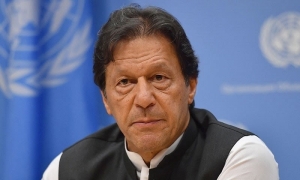
|
|
|
|
|
|
|
|
|
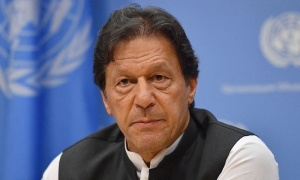
|
|
|
|
|
|
|
|
|
|
|
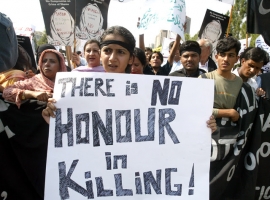
|
|
|
|
|
|
|
|
|
|
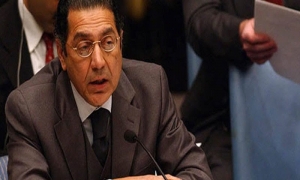
|
|
|
|
|
|
|
|
|
|
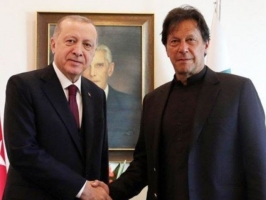
In Focus
PM Imran Khan and Turkish President Erdogan discuss the pandemic, PK-8303, and India
And there has been a growing Pakistan-Turkey convergence during the recent months
According to an official statement by the Foreign Office, on 25 May, Turkish President Recep Tayyip Erdogan made a telephone call to PM Imran Khan. Erdogan reiterated Turkey's strong support to Pakistan and offered condolences on the 22 May tragic crash of the Pakistan International Airlines flight PK-830 in Karachi that killed 97 people onboard. ("President Erdogan calls PM Imran, offers condolences over Karachi plane crash," The Express Tribune, 25 May 2020)
Imran briefed Erdogan regarding Pakistan's pandemic policy; thanked him for medical equipment; discussed long-term socio-economic repercussions of the virus; emphasized his call for 'Global Initiative on Debt Relief' and spoke of the need for a coordinated, comprehensive policy on debt restructuring and relief for developing countries to tackle Covid-19 challenges.
India and J&K surfaced in the dialogue. According to available reports in Pakistan media, Imran briefed the Turkish President regarding Jammu and Kashmir's worsening human rights conditions due to the military crackdown and double lockdown; shared concerns regarding India's attempts to gerrymander the LoC during COVID; and said the Indian government was using the pandemic to demonize Muslims in India. ("President Erdogan calls PM Imran, offers condolences over Karachi plane crash," The Express Tribune, 25 May 2020)
The heads of states also exchanged Eid greetings and spoke of enhancing bilateral cooperation to combat coronavirus.
Pakistan, Turkey and the KL Summit. There has been a rapprochement between the two countries during recent months. For a quick background, Pakistan and Turkey were considered pioneers in the December 2019 Kuala Lumpur Summit, a new-Muslim alliance visualized by Malaysian PM Mahathir Muhammad as a 'mini Islamic summit' and widely viewed as a challenge to the Saudi leadership and Organization of Islamic Countries. The forum was to be launched with a core group of five nations – Malaysia, Turkey, Indonesia, Pakistan (four of the most populous Muslim countries) and the exceedingly wealthy Qatar, to address issues of Islamophobia, poverty and broadly "the plight of the Muslims". ("Kuala Lumpur Summit: Five major issues facing the Muslim world," Al Jazeera, 18 December 2019)
On 29 November PM Khan said he would be attending the meet but backtracked after his Riyadh visit causing Erdogan to blame threats by the Saudi regime for Pakistan's absence. Foreign offices of both Pakistan and Saudi Arabia denied the allegations and maintained that Pak-Saudi relations were cordial. Pakistan said they omitted the meet as the "division in the Ummah" had to be first discussed. ("Does Saudi Arabia feel threatened by the new Muslim alliance?," The New Arab, 3 January2020) Erdogan's outburst caused serious embarrassment and criticism for Pakistan. Hence, Erdogan's recent reiteration of supporting Pakistani brethren is noteworthy.
And then the Ertugul magic. Outside government relations, there is a growing link between the two societies. With the Turkish TV series 'Ertugul' gaining popularity amongst Pakistanis, the growth of Turkey-Pakistan relations on the social side is evident. ("Analysis: Ertugrul and the lure of Turkish dramas in Pakistan," Al Jazeera, 14 May 2020.)
Also read: "Turkish TV series ErtuÄŸrul takes Pakistan by storm," The Express Tribune, 17 May 2020; "What is Dirilis Ertugrul and why does Imran Khan want Pakistanis to watch it?," Dawn, 9 May 2020; "A summary of Ertugrul's impact on Pakistan," Dawn.
|
|
|
|
|
|
|
|
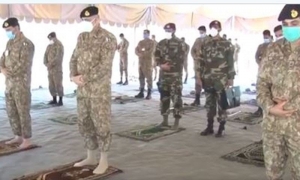
|
|
|
|
|
|
|
|
|
|
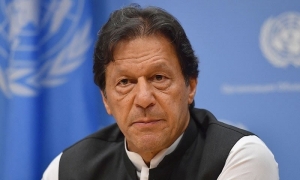
PAKISTAN THIS WEEK
D. Suba Chandran
Four significant developments took place within Pakistan during this week; repeated reference from Imran Khan on a false Indian flag march; accusations and counter-accusations about the implications of the CPEC by the US, China and Pakistan; incidents of violence indicating a trend in the Pak-Afghan and Pak-Iran borders; and the threats posed by the locusts to Pakistan's food security.
Imran Khan predicts an Indian false flag march, warns twice during the week
During the week, Pakistan's media twice referred (Dawn, The News, The Nation, and the Express Tribune) to Imran Khan making predictions about a false flag operation by India. According to him, India would want to divert the world attention, from the situation in J&K, hence would engage in a false flag operation. ("False flag operation by India imminent: Imran," Dawn, 21 May 2020)
Besides Imran's statements, there were also a series of press releases, meeting notes and telephone conversations by the Foreign Office, Foreign Minister and numerous columns in the newspapers. The primary theme of these press releases, statements and opinions are the same – the situation in J&K, and the BJP's policy towards it. According to them, the situation within J&K is of oppression, violation of basic rights of the Kashmiri Muslims, genocide, changing the demography of Kashmir valley etc. All these developments have resulted in the rise of domestic resistance, led by educated Kashmiri fighters like Burhan Wani and Riyaz Naikoo. For Pakistan, first is the cause, and the second one is the effect.
So, what does Pakistan want in the above cause and effect? It wants the international community to intervene in J&K, and pressurize the BJP government. The statements – whether Imran's statement on Indian false flag march or the conversation between Pakistan's foreign minister and the UN Secretary-General ("India using corona to brutalize IOJ&K: UN Chief told," The Express Tribune, 23 May 2020) underlines the same.
Why would Pakistan want an international intervention? Three reasons: first, it wants to internationalize the J&K problem, which has been a part of its global strategy during the last two decades. Second, both the military and the polity within Pakistan fear that the BJP government would get away with its policies towards J&K and its resultant changes. Finally, Pakistan also wants to use the above to bring itself to the centre stage in Srinagar. Many within Pakistan believe that the country since the days of Musharraf and the ceasefire announcement in 2004 has lost its position within the Kashmir Valley.
China and Pakistan respond to the US criticism on the negative implications of CPEC
The second major development during the week, was the accusation and counter-accusation of the US, China and Pakistan on the nature of CPEC and what it would do to Pakistan.
What did Alice Wells say? The US Assistant Secretary of State to South Asia, during this week, made a scathing remark during the week on Pakistan's debt crisis, resulting from the China Pakistan Economic Corridor (CPEC). In a statement, she said, referring to the COVID-19 crisis, Beijing has to take measures that would lift the burden of "predatory, unsustainable and unfair lending is going to cause to Pakistan," and expected that China would either waive off the debt or renegotiate the loans. She also wanted China to create a "fair and transparent deal for Pakistani people." ("US urges China to waive off Pakistan's debt amid Covid-19 crisis," The Express Tribune, 21 May 2020)
Wells statement is not new. She has made a similar observation earlier on the CPEC as well.
China Responds. Immediately after the statement by Wells, a Chinese spokesperson, responded to her criticism and accused the US of always asking Pakistan to do more. Besides underlining the rhetoric of having established and consolidated an all-weather friendship, the statement talked about China and Pakistan working "together to promote regional peace and stability." He also commented: "We take Pakistan as an equal partner and never asked Pakistan to "do more". We support Pakistan's own model of development and never intervene its domestic affairs. We highlight Pakistan's responsible role in regional affairs and never exert pressure." ("Chinese Embassy says Alice Wells' speech to defame Sino-Pak ties," The News International, 22 May 2020)
The same message was delivered again by China, during a dialogue inside Pakistan celebrating 69 years of diplomatic relations between the two countries. The Chinese Ambassador commented, "China will be a partner to Pakistan, but never its teacher." ("China will be Pakistan's partner, never its teacher," Dawn, 23 May 2020)
Separately, Pakistan's Ambassador to China wrote a lengthy note that was published by the local newspapers on the occasion. ("From Khunjerab to Gwadar: 69 years of cooperation and connectivity," The Nation, 22 May 2020)
Violence in KP and Balochistan
There were a series of IED explosions, during the week, in Balochistan and KP killing soldiers of the military and para-military. In the first instance, on 18 May, in Balochistan, six soldiers returning to their base camp were killed in an IED explosion. The same day, in another incident, involving a cross-firing one solider was killed in Balochistan. This is the second major incidence of violence in Balochistan this month. Early May, in Balochistan, closer to the border with Iran, six soldiers were killed in another IED explosion. ("Seven FC soldiers embrace martyrdom in separate attacks in Balochistan," The Express Tribune, 19 May 2020)
On the same day (18 May), North Waziristan also witnessed an IED explosion, resulting in the killing of a soldier. ("Soldier martyred, three injured in blast in North Waziristan," Dawn, 19 May 2020) During the week, the police chief of the KP was also quoted to have stated that the militancy in reviving in the Swat valley, after a gap of ten years. ("A decade later, militancy rearing its head in Swat," The Express Tribune, 20 May 2020) During the end of the previous decade, there was a serious insurgency within the Swat valley; Pakistan deployed its military to contain the insurgency led by local and Afghan militants belonging to different Taliban groups.
An analysis in Dawn last week (17 May) focussed on the increase in violence in these two provinces, during the last two months and also the possibility of the return of TTP militants from Afghanistan. According to this analysis by Amir Rana, "the TTP and other militants were trying to hit their native towns to reclaim their lost influence. Outfits like Jamaatul Ahrar could also try to regroup in their towns of origin, including Bajaur and Orakzai."
The threat from Locusts to Pakistan's Food Security
On the non-traditional security issues, the Food and Agriculture Organization (FAO) has raised the level of threats from the locusts to Pakistan's food security. ("FAO prepares crisis appeal for Pakistan's locust issue," Dawn, 18 May 2020)
During the last two months, there has been an extra emphasis on the threat from the locusts. While the locust menace has been an issue for the last many years, this year, the threat has increased manifold.
First, the problem of desert locusts is not limited to Pakistan alone. Across West Asia and all the way up to Northern Africa, along the desert regions, locusts have become a big issue this year. Multiple reports from North Africa also highlights the menace that the locusts pose.
Second, according to preliminary reports, there is a change in the breeding cycle of the locusts, that is increasing the threats posed by them. From two breeding seasons, now they have three.
Third, this year, there is a fear that the locusts would pose a serious problem to food security. The latest report from the FAO highlights these issues, especially for Pakistan.
Fourth, there is a federal problem in fighting the locusts. The problem is extremely high in Sindh. Though South Punjab and Balochistan also have the problem, the intensity is high in Sindh, which is governed by the PPP.
Fifth, there are also reports hinting that the locusts would spread Sindh, move further towards Balochistan and cross into Iran. A regional approach is needed; one is not sure, whether Pakistan is looking at it as an option.
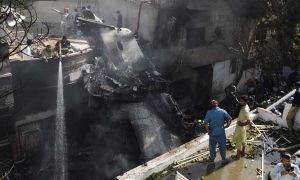
|
|
|
|
|
|
|
|
|
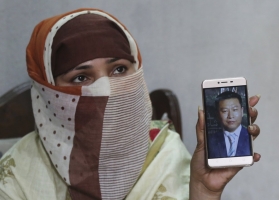
|
|
|
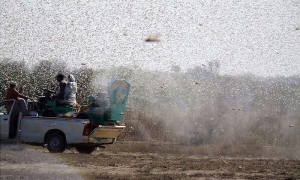
|
|
|
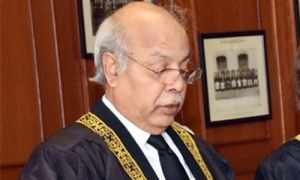
|
|
|
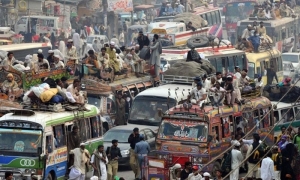
|
|
|
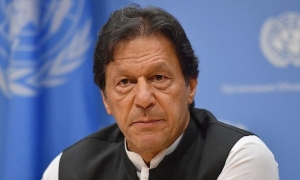
|
|
|
|
|
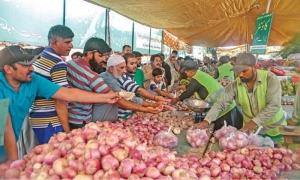
PAKISTAN THIS WEEK
Pakistan eases the lockdown, holds National Assembly meeting, bans three organizations, and decides to build the Diamer-Bhasha dam
D. Suba Chandran
Four significant developments took place within Pakistan during this week, with the most important being the decision to ease the lockdown.
Pakistan eases the lockdown
The most significant development of the week, which many within Pakistan criticize as a gamble, is Imran Khan's decision to ease the lockdown. Though Imran Khan has linked his decision to the sufferings of the poor and the working class, the real reasons seem to be the pressure from the economic community. Though he publicly stated that the decision to lockdown was "elitist", the reason to open came from the business community, and also the need for Pakistan to ensure its economic. Exports have come down with serious implications for the economy; the State Bank of Pakistan has published a report during the week on the subject.
The government decided to ease the lockdown, with a set of Standard Operating Procedures (SOPs). Unfortunately, neither the vendors nor the shoppers could follow the SOPs. News reports and images (of people shopping without social distancing and the traffic) from Pakistan highlight the dangers in lifting the lockdown. The provincial governments in Sindh and Punjab have threatened to reimpose the lockdown, if the SOPs are not adhered to.
Despite the inability to impose the lockdown, the federal government has further advised the provincial governments to restart the public transport. While Punjab and KP have readily agreed, Sindh has differed the decision.
The federal government has also started the domestic flight operations. On Saturday, the first flights took off between Lahore, Karachi and Islamabad.
The National Assembly meets, with Imran Khan skipping it
On 11 May, the National Assembly met after two months. Instead of working together towards fighting the COVID-19, the meeting highlighted the faultlines along the political and provincial lines. The difference between the federal government and Sindh was obvious and between the PTI and the opposition parties.
The foreign minister blamed the PPP for being provincial, for which Bilawal Bhutto wanted Qureshi to either tender an apology or resign. Sherry Rehman, a senior PPP Senator, questioned the absence of Imran Khan and asked what important task that the Prime Minister has, and also asked who is running the country.
Instead of discussing a national strategy to fight the COVID-19, there was a partisan discussion on the 18th amendment. The opposition blamed the government for attempting to scrap it using the COVID as an excuse. The government has to make a promise that the government would not scrap the same.
The government bans three more organizations
On 12 May, newspapers in Pakistan reported the government adding three organizations from Sindh - Jeay Sindh Qaumi Mahaz-Aresar Group (JSQM-A), Sindhu Desh Revolution Army (SRA) and Sindhu Desh Liberation Army (SLA) adding to the list of proscribed organizations.
Since 2001, Pakistan has been holding a list and adding to the same. The sectarian organizations such as the Lashkar-i-Jhangvi and Sipah-i-Mohammad Pakistan tops this list, besides the militant groups from Balochistan, and those fighting in J&K such as the LeT and JeM.
However, the problem is practice. Though these organizations are banned legally, most of them remain active and operate in public. The reason was simple. Some political parties find them useful and politically expedient. So does the Deep State, for external reasons in Afghanistan and India. The bigger problem is the investigation and judicial trial. Even the judiciary has asked the government to reform the criminal procedure system within Pakistan.
Finally, the real problem is the cosmetic nature of the government's attempts and is aimed at addressing the FATF concerns. Most of the actions that Pakistan has undertaken since 2001 are related to external pressure. The 9/11, Mumbai attacks and the FATF, were some of the primary reasons for the cosmetic nature of the response. In recent years, the threat of FATF's Grey List was the primary reason for Pakistan's strategy.
The government decides to build Diamer Bhasha dam
One of the biggest decisions during the week was also to build the Diamer-Bhasha dam. The decision has been one of the most debated within Pakistan. Besides the question of capability and funds, there was a serious political question and also royalty, as the dam involves Gilgit Baltistan.
On 13 May, the government signed a joint-venture with the Chinese state-run China Power and Frontier Works Organization worth Rs442 billion. According to available news reports, the construction includes the following: construction of the main dam, an access bridge, diversion system, and the 21MW Tangir hydropower project.
According to the Nation, the Diamer Basha Dam project, "with a total financial outlay of about Rs1406.5 billion will be completed in 2028. The total financial outlay includes land acquisition and resettlement, confidence building measures for social uplift of the locals, construction of dam and power houses. The Project has a gross storage capacity of 8.1million acre feet (MAF) and power generation capacity of 4500 megawatt (MW), with annual generation of 18.1 billion units per annum."
In Brief
COVID-19
COVID-19 cases cross 40,000 in Pakistan
According to the latest figures, Pakistan has crossed 40,000 plus cases with more 860 deaths. Sindh and Punjab have a maximum number of cases with 15,000 plus and 14,000 plus respectively. KP has more than 5400 cases, and Balochistan has around 2500. The capital territory (Islamabad) has close to 950 cases.
Sindh accuses the Centre of not providing even a single ventilator
"Not a single ventilator has been provided so far, nor a laboratory has been set up for testing Covid-19 patients" has been the official response to the claim by the Centre that it has provided Sindh a lot of medical equipment through the National Disaster Management Authority to the province.
Sindh and the Centre have been locked down in a series of accusations and counter-accusations on fighting COVID-19. Both the PPP and PTI have substantial differences on how to fight the virus.
("Sindh refutes Centre's claim of providing medical equipment," Dawn)
Pakistan starts domestic flights
As a part of the government's decision to ease the lockdown, the first domestic flight operations since the closure, following the COVID outbreak. The business community, in particular, has been demanding the opening of domestic air operations. The first flight – from Karachi took off to Lahore and Islamabad.
Earlier, the government has announced resuming the public transport system. While KP and Punjab have agreed to the same, Sindh has dithered it.
("Limited domestic flights operation resumes," Dawn)
China sends 20 tonnes of medical equipment to Pakistan's NDMA
The National Disaster Management Authority of Pakistan received 20 tonnes of medical equipment; according to a news report, the consignment included the following: 99 ventilators, 260,000 N-95 masks, 300 protective suits, 600 safety goggles, over 7,000 KN-95 masks, and 6,000 surgical masks. ("20 tonnes of medical equipment arrive from China: NDMA," The News)
"In Pakistan, the problems have been compounded by a dysfunctional state structure," says an analysis
In the Nation, an analysis says that in Pakistan, "the problems have been compounded by a dysfunctional state structure, and decades of misplaced priorities. Over the past thirty years, Pakistan has seen a consistent decline in its public healthcare system, which has been made worse by debilitating brain-drain of qualified healthcare professionals. In the circumstances, vested commercial interests have resulted in the creation of an 'elitist' private healthcare industry, with mostly substandard facilities, which caters to a small fraction of our population who can afford to foot the exorbitant bills."
Saad Rasool, "A dysfunctional social contract?," The Nation)
INTERNAL
Government releases information in media, about Shahbaz Sharif's corruption trail
Special Assistant to the Prime Minister on Accountability Shahzad Akbar along with Federal Minister for Information and Broadcasting Senator Shibli Faraz, at a news conference have elaborately accused the PML-N leader Shahbaz Sharif of corruption.
In a lengthy media conference, both attempted to provide a detailed trail of corruption on how Shahbaz used his party members and fake companies to transfer funds to Shahbaz Sharif's personal account.
("Trail of Shahbaz Sharif' kickbacks found," The News)
Pakistan claims to arrest a local cop, who is a member of RAW sleeper cell
The News reported about the arrest of an Assistant Sub-inspector (ASI) by the Federal Investigation Agency, who was posted to the Special Branch as a key member of a RAW sleeper cell and running a large terrorist and surveillance network. The News quoted officials stating "the suspect who had joined the Sindh police force in 1991 was provided funds on the directives of the MQM leader Mehmood Siddiqui, former APMSO. Ali had also visited to India for training in 2008. Associated with the Muttahida Qaumi Movement-London, he is accused of being involved in target killings and terrorism."
("Cop running RAW, MQM-London terrorist network held," The News)
"A slight surge in terrorist attacks in the last two months" in Pakistan: Analysis
Muhammad Amir Rana in his analysis in Dawn writes that there has been a surge in acts of terrorism within Pakistan. He writes, "though it cannot be linked to the pandemic as there is no major shift from the pre-virus trends."
According to the analysis, "the merged tribal districts of Khyber Pakhtunkhwa and some parts of Balochistan have been hotspots of insecurity and violence for several months now. There have been concerns about the growing presence and activities of militants in parts of the tribal districts, mainly North and South Waziristan. Most security incidents, including militant attacks, in recent weeks have been reported from areas closer to the Pak-Afghan border, such as Datta Khel. Militants may also be expanding their areas of presence and operation." ("Terrorism under Covid-19," Dawn)
EXTERNAL
Pakistan announces opening Chaman and Torkham borders with Afghanistan for six days in a week
Pakistan has decided to open Afghanistan-Pakistan border at two major points – Chaman in Balochistan and Torkham in KP for six days. The border points were closed during the end of March, following the COVID outbreak; now, it would be opened for six days during the week.
("Torkham, Chaman borders opened for six days a week," The News)
Dawn in its editorial questions the wisdom of Pakistan's Minorities commission to discuss Indian Muslims
Pakistan government recently has announced the formation of a National Minorities Commission. Many within Pakistan have questioned the decision to Ahmediays outside the purview of this Commission; other activists have questioned the decision to form the Commission not at a Parliamentary body.
Meanwhile, the Commission met for the first time this week and discussed the status of Muslims in India. Dawn, in its editorial, asked the following: "While one cannot deny the suffering of Muslims in India, and there is no harm in showing solidarity with beleaguered people living in any part of the world, would it not make more sense for the Commission to focus on problems faced by minorities at home, and leave the prime minister, foreign minister and the Foreign Office to dilate on problems abroad? Unfortunately, it seems as if Pakistan's minorities are expected to constantly have to prove their loyalty to the state and its dominant narrative, rather than being accepted as truly equal citizens, in a way that is neither patronizing nor demeaning."
(Editorial, "Minority meeting," Dawn)
GILGIT BALTISTAN
New Presidential Order to hold the elections in Gilgit Baltistan
The PTI government has issued a new order – "Gilgit-Baltistan Election and Caretaker Amendment Order, 2020" that would allow the formation of a new caretaker government in Gilgit Baltistan, with an objective to hold elections. The existing GB Assembly will complete its five years tenure in June 2020.
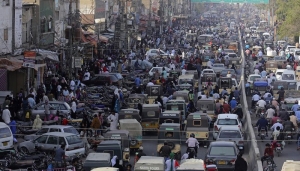
In Focus
By Lakshmi V Menon & Abigail Miriam Fernandez
Nation will have to learn to live with the virus: PM Imran Khan
At a press briefing on 15 May, Imran Khan stated that the country could not afford an indefinite lockdown and the nation would have to learn to live with the pandemic. He also added that it was necessary to lift the lockdown in order to employ the 25 million people who had lost jobs due to lockdown. He also stated that the government would start another cash distribution program, an eight billion dollars stimulus package from 18 May for those daily wage earners who had lost their jobs because of the lockdown.
Special Assistant to the Prime Minister on Health stated that Pakistan would soon start the production of antiviral Remdesivir which has shown promising results in treating Covid-19 and made it mandatory for people to wear masks in public places. However, the recent statements and initiatives by the PM seem shortsighted as the decisions made seem hasty and a clear message on the threat of the virus is still missing. ("PM urges nation to learn to live with pandemic," Dawn, 16 May 29020)
The threat of the coronavirus does not seem to faze the public, many resumed to commercial activities as usual with the lockdown being lifted. SOPs put in place were violated as people crammed the streets taking little or no precautionary measures at all. As a result, provincial governments were forced to take action by shutting down shopping centers despite repeated warnings by the authorities. ("Violating SOPs," Dawn, 16 May 2020)
The National Accountability Bureau gets ready with new cases against the Sharifs
NAB Lahore has prepared a fresh corruption reference involving 7 billion rupees against Nawaz Sharif, Shahbaz Sharif and Maryam Nawaz regarding assets beyond means, expansion of their Jati Umra residence by "illegally acquiring" hectares of land in Raiwind, money laundering and the Chaudhry Sugar Mills case. The reference sent to NAB chairman for approval, identifies Nawaz Sharif, Shahbaz Sharif and Maryam Nawaz as prime suspects and 16 other Sharif family members, including Sharif brothers' mother Shamim Begum, as suspects and has "100 prosecution witnesses and four approvers" (against the Sharif family).
Also, the NAB Lahore has prepared a reference against Jang Group Editor-in-Chief Mir Shakilur Rehman, Nawaz Sharif and two others in the 54-kanal land case, that were sent to the chairman are likely to be approved next week.
In November 2019, Nawaz Sharif had secured bail in the Chaudhry Sugar Mills and Al-Azizia Mills corruption case, for which he was serving a seven-year sentence; and Maryam Nawaz secured bail in the Chaudhry Sugar Mills case. Ever since, Nawaz has been in London for medical treatment. Shahbaz Sharif has also received a summons from NAB. ("NAB prepares another case against Sharifs, Maryam", Dawn, 16 May 2020)
Pervez Hoodbhoy on Science, Religion and COVID-19 in Pakistan
The science-religion-coronavirus nexus will prove costly for Pakistan's Covid-19 battle. Hoodbhoy presents four major arguments in his analysis in Dawn. ("Some take science seriously", Dawn, 16 May 2020)
First, he says while China has "flattened the curve" and is repositioning itself as a global leader battling the pandemic, Donald Trump's US and Imran Khan's Pakistan are scorning science, rebuking epidemiologists and surrendering to religious forces; thus, jeopardizing the lives of millions of Americans and Pakistanis. Trump and Imran raise significant questions regarding the priorities and approach of the leadership and the people in tackling the pandemic.
Second, Hoodbhoy blames Pakistan's Faith-Unity-Discipline national slogan. Imran reverentially listening to Maulana Tariq Jamil seeking forgiveness for scantily clad women who brought down the 'divine punishment' of the virus and the Sunni and Shia ulema warning about the shutting of shrines and mosques followed by President Arif Alvi's namesake '20 conditions' paint bleak images.
Third, he criticizes the PTI government for not-prioritizing education, calls for a revamp of the education system to promote enlightenment, induce rational outlook and make Pakistan more governance. Last, he criticizes the lack of scientific thinking and disregard to social distancing, epidemiology and virology for the surge in infection and deaths. He points out that even as coronavirus deaths are spiraling, unmasked and ungloved people are crowding the markets.
In Brief
By A Padmashree & P Harini Sha
COVID-19
An analysis explains Pakistan's COVID-19 strategy in six points
An analysis in Dawn by Fahd Hussain, looks at Pakistan's strategies towards fighting the COVID. It explains the same in six points: "January – May 2020 story tells us the following about Pakistan: one, we dithered. Two, we took corona lightly. Three, we wasted at least February and two weeks of March. Four, the federal government provided weak leadership. Five, we could not do the lockdown that was needed at the time it was needed. Six, we politicized a public health issue. The opinion article on Dawn assesses the steps taken by the federal government since January 2020 in fighting against COVID-19 and positions Pakistan in between the success and failure countries. He emphasizes the need for the leadership to learn from the countries who won the first round and not to compare the losses with failed leaders in containing the virus. ("Vaccine for success," Dawn, 16 May 2020)
ECONOMY
SBP announces the policy rate cut to 8 per cent again in two months
The State Bank of Pakistan announced that it is reducing the policy rate by 100 basis points to 8 per cent which is the fourth cut by the bank within two months. This decision reflects the Monetary Policy Committee's view on inflation which will fall closer to the lower end due to a recent cut in domestic fuel prices. SBP also added that inflation could fall further than expected if economic activity fails to pick up as expected in the next fiscal year. ("Economic slowdown due to lockdown can't be prevented: State Bank," The News International, 16 May 2020)
INTERNAL
Najam Sethi says public sentiment has turned against Imran Khan
Najam Sethi, one of the most influential analysts in Pakistan argues that when there is a need for the leader at state circumstances, the PM has been inept, thereby irking public reactions against him.
According to Sethi, "public sentiment has turned against Imran Khan who has been shown up as an incompetent, blundering partner, exactly when state circumstances require a political leader of substance. The Miltablishment is being blamed for this mess. Ominously, Imran, too, is inclined to spread his wings from time to time. The problem is that it is in the nature of the office of a popularly elected or popularly selected prime minister to demand a degree of autonomy from the powerful Miltablishment which is loath to surrender it."
He concludes his analysis titled "Nature of the Problem" that "we may expect the Miltablishment to watch and wait until such issues have been resolved. Or until a popular storm is kicked up exogenously on any big issue and a scapegoat is required in the national interest".("Nature of Problem," The Friday Times, 15 May 2020)
PROVINCES
Punjab to reopen transport and shopping malls from next week.
The Punjab government further relaxes the lockdown from 18 May and permitted to reopen public transports, shopping malls, and automobile production units while reporting 11 deaths and 353 new Coronavirus cases in 24 hours. The production units will function seven days a week and the showrooms will be allowed for four days a week under SOPs, said the Punjab Industries and Trade Minister. ("Punjab permits opening of malls, public transport from May 18," The Express Tribune, 16 May 2020")
"Punjab and KP agrees to open the public transport, while Sindh refuses to do so"
Governments of Punjab and KP have decided to allow the functioning of public transport to benefit the common and laborers after the request from the Prime Minister. But the Sindh Transport minister has said that due to fear of virus spread in the province and announced that it will not relax the ban. ("Punjab, KP decide to conditionally lift the ban on public transport", Dawn, 16 May 2020)
China on the Diamer-Bhasha Dam
At a press conference on 15 May, Foreign Ministry spokesperson from China responded to questions from CCTV, Xinhua and other media housed on various global developments. The spokesperson also commented to APP question on Pakistan's move on commending China's decisive and timely measures to combat the novel coronavirus under the leadership of President Xi Jinping and appreciating its valuable especially during the pandemic.
Further, question raised by PTI on the Diamer-Bhasha dam project and the recent comment by India's Minister of External Affairs to which the spokesperson said "China's position on the Kashmir issue is consistent. The economic cooperation between China and Pakistan aims to boost local economic growth and improve people's livelihoods for the benefit of all." ("Foreign Ministry Spokesperson Zhao Lijian's Regular Press Conference on May 15, 2020," Ministry of Foreign Affairs, the People's Republic of China, 15 May 2020)
ON INDIA
India is the revisionist power in Kashmir, argues an analysis in The Friday Times
An analysis in the Friday Times by Ejaz Haider claims India to be a revisionist power in Kashmir, while Pakistan is a status quo power.
According to Haider, "Pakistan has no designs on India. But Kashmir is not a part of India. It is an internationally-recognised dispute, a fact India denies blatantly in contradiction to UN Security Council resolutions as well as bilateral arrangements. Additionally, and separate from the disputes, Pakistan is a status quo power because it checks India’s desire to project power in South, West, and Southern Asia."
Second, "while India is a revisionist power in its desire to project power, it is an irredentist power in relation to the Kashmir dispute that relates, centrally, to ascertaining Kashmiris’ right to self-determination."
Finally, he concludes, "India is not only a revisionist state, to the extent of Kashmir, as it existed on the eve of August 14, 1947, it is also an irredentist state." ("India's irredentism on Kashmir", The Friday Times,15 May 2020)
Also read on India and J&K
Editorial, "Let Kashmir breathe," Dawn, 16 May 2020
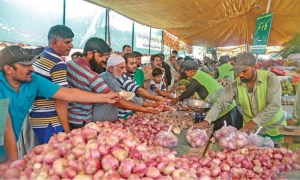
In Focus
By Lakshmi V Menon & Abigail Miriam Fernandez
Disregard for SOPs peaks Covid-19 cases
With traders and customers disregarding safety/health protocols set by provincial and federal governments, on 14 May Pakistan's confirmed COVID-19 cases surged to 36,736 and fatalities to 788. However, 10,155 have recovered. Of the total count, Sindh reported 14,099, Punjab 13,561, KP 5,423, Balochistan 2,239, ICT 822 and PoK 592. Of the total fatalities, Punjab reported 284 deaths, KP 275, Sindh 243, Balochistan 27, ICT 6, and PoK 5.
SOPs are being flouted despite Centre and Provinces repeatedly urging citizens to practice social distancing. Buyers are crowding together in marketplaces wearing no masks. The effect of the present behaviour of disregard for SOPs will further peak Pakistan's Covid-19 cases in the coming weeks.
In Punjab, Lahore is becoming the epicentre of the virus with 6,699 cases amongst the collective figure of prisoners, common citizens, and those isolated at quarantine facilities. Sindh has a 17 per cent recovery rate.
Meanwhile, the Ministry of Overseas Pakistanis informed that at least 49 flights would operate between 11 and 21 May to bring back 11,660 overseas Pakistanis. ("Least regard for SOPs causes surge in coronavirus cases," The News International, 15 May 2020)
Pakistani academic says the BJP government cannot hold the land and the people for good in J&K for two reasons
The opinion article in the Express Tribune by Prof Moonis Ahmar is critical of the Indian government's move to further amend the Jammu and Kashmir Reorganization Act 2019 by allowing Indian nationals and their children residing in J&K for permanent residence thereby enabling them to apply for jobs and scholarships.
He says the BJP government cannot hold the land and the people for good in J&K for two reasons. First, Kashmiri Muslims in J&K have refused to accept the humiliating acts of the government of India that have tried to reduce them to a minority in the region, thus suppressing their uprising will not be easy. Second, India lacks support from the international community on its decision. Further, the BJP government's strategy of using the pandemic as a cover-up to neutralize all protests against the Indian citizenship act and the J&K Reorganization Act will not hold for long.
The opinion concludes by stating that the Modi government has successfully implemented the J&K Reorganization Act and domicile policy despite opposition from both Pakistan and the Kashmiri Muslims, showing that global attention is now focused on the pandemic. ("How is India changing the demography of Occupied J&K?," The Express Tribune, 15 May 2020)
Former Pakistan High Commissioner writes about a double lockdown in J&K to reduce and destroy the Muslim minority
Ashraf Jehangir Qazi, a former ambassador to the US, India, and China comments that the double lockdown imposed by India on J&K aims to reduce the Muslim majority of J&K as a political identity and destroy the 200 million Muslim minority of India as a viable political community. He argues that the lockdown since scrapping Kashmir's special status as "the building blocks of genocide" and obstructing peace in the subcontinent. ("COVID-19, Kashmir, and US," The News International. 15 May 2020)
In Brief
By A Padmashree & P Harini Sha
COVID-19
Japan to assist Pakistan in Covid-19
Japan has agreed to grant assistance of 4 million dollars to help Pakistan in fighting coronavirus. The UN office for project services will give equipment, material, and technical support based on the ground situation in Pakistan through this fund. ("Japan to provide $4m Covid-19 aid," Dawn, 15 May 2020)
PML-N's leader questions the reliability of the count of COVID-19 patients in the country.
The opposition leader has blamed the government for understating the suspected cases in the region. He has predicted that the cases have surged a six-digit mark and held the government responsible for its neglectful actions in handling the crisis. He stated that "the government was leading the country into irreversible disaster through lies, confusion, and blunders". ("PML-N challenges official statistics of Covid-19," Dawn, 15 May 2020)
The government enforces strict measures in places violating standard operating procedures (SOPs)
Minister of information and broadcasting has decided to monitor places where SOPs are being violated by the public. It will be publishing a list of areas after observation to enforce strict action to prevent the spread of the virus. ("Govt mulls lockdown in areas violating SOPs," Dawn, 15 May 2020)
INTERNAL
No exams. All Pass, says the government
The Minister for Education and Technical training said that the students of classes 9 and 11 will be promoted to the next class without an examination. He said the students of class 10 and 12 will have to appear only for the final exams and their results will be evaluated on marks obtained in 9th and 11th. (All students promised promotion; No exams, says govt, The News International, 15 May 2020)
PROVINCES
Sindh government warns to close the markets if the SOPs are not followed
Sindh government warns the shopkeepers that it will close shops that are found violating SOPs; further they appealed the business communities to comply with the agreed Standard Operating Procedure (SOP). The government notifies the people that the Coronavirus threat is not over and significant to be cautious and follow strict SOPs.("City markets will be closed again if SOPs violated," 15 May 2020 The News International)
Nine more die in Sindh
Nine more lives have been claimed by novel Coronavirus, raising the death toll to 243 in Sindh province. Sindh has recorded 758 new cases in 24 hours an 17 per cent of 4,487 samples tested positive of Coronavirus within two days. The Chief Minister urges people to not be influenced by fake propaganda on COVID19 and come forward to test in case of symptoms. ("CM Murad Ali Shah calls for eschewing propaganda as COVID-19 affects 758 more, kills another nine in Sindh," The News International, 15 May 2020)
Punjab also warns of a strict lockdown, if the SOPs breached
The Punjab government has decided to enforce strict actions against the violators of SOPs as the markets were opened since Monday. Most of the markets were reopened after the relaxation of lockdown in Punjab, however unusual rushes took the streets everywhere which pose a potential threat to the spread of the pandemic. The Law Minister said Punjab will reconsider its relaxations on lockdown if SOPs are not followed strictly. ("Strict lockdown if SOPs breach continues: Raja Basharat," 15 May 2020, The News International)
Joint venture deal to construct Diamer-Bhasha dam sealed
The China Power and the Frontier Works Organisation have contracted a 442 billion rupees deal to construct the Diamer-Bhasha dam. The contract deal has taken place after 40 years since the drafting of the original plan. It is said to be funded from the growth in the public sector and commercial loans. This will serve as a booster to Pakistan's economy, creating more than 16,000 jobs and demand for the construction industry. ("Dam Deal," Dawn, 15 May 2020)
EXTERNAL
"Doctrines of strategic depth devised by our own establishment are no better than those of the 'enemies' we love to hate," says an opinion
An opinion in Dawn on the recent attacks in Kabul and Nangarhar says that the focus should be to find the reason for hate from violent ideologies that in finding which militant group responsible for the killing. He also stated that "No state — and its privileged segments in 'developed' regions — can lay claim to a moral high ground while the people of its own ethnic peripheries are enslaved as colonial subjects." ("Of strategic depth," Dawn, 15 May 2020)
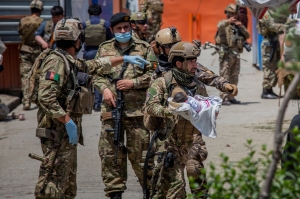
Editorial
Violence in Afghanistan and the Media in Pakistan
On Tuesday (12 May), a group of militants stormed a maternity clinic in Kabul run by the Doctors without Borders; an indiscriminate firing continued, leading to the killing of mothers who have just given birth, just born babies and pregnant mothers, besides the health workers. The immediate count was 16 plus; it should have increased subsequently. More than 18 babies will now grow without their mothers and would have never seen their mothers face.
The same day, in Nangarhar, a funeral was targeted by a suicide bomb, that killed more than 20. How did the print media in Pakistan respond to these attacks in Afghanistan?
The News, in its editorial, (Carnage in Afghanistan, The News, https://www.thenews.com.pk/print/658273-carnage-in-afghanistan) was hoping that the US was looking at the visuals, in which mothers were seen hugging to protect their babies, even they have to sacrifice their lives. It said: "two previous attacks in Kabul, one only a few hours before the hospital siege and another series of coordinated bomb blasts in Kabul on Monday have been claimed by the IS. Allegations surfacing on social media suggest these were facilitated by the Taliban." The editorial hinted that those behind the deal with the Taliban should take up the responsibility and step up. It said, "Some kind of action is needed. Some kind of responsibility has to be attached."
The Nation, in its editorial, focussed on the lack of any significant improvement in Kabul vis-à-vis the law and order situation. It commented: "What's obvious is that the Taliban do not respect the present government. Nor has the US succeeded so far in convincing the Taliban to accept the current government as a legitimate stakeholder in the future political setup." (Acts of Cowardice, https://nation.com.pk/E-Paper/islamabad/2020-05-14/page-6/detail-2)
Dawn, commenting on "strong clues" linking the Islamic State for the Kabul attack, appeared to blame the environment. It concluded: "as the government and the Taliban square off, IS and others of their ilk will take advantage of the chaos and continue to perpetuate their business of death and destruction." (Shocking Target, Dawn, https://www.dawn.com/news/1556974/shocking-target)
An analysis in the Express Tribune attempted to fix the blame on the IS and trying to delink the Taliban. The reasoning is "Kabul is not a Taliban stronghold. The area where the hospital was attacked is a predominantly Shia community." ( Stakeholders of violence in Afghanistan, The Express Tribune, https://tribune.com.pk/story/2220712/6-stakeholders-violence-afghanistan/). Hence, the Taliban could not have carried out these attacks.
Perhaps, the Taliban did not; but the above logic is flawed. Is Kabul not a Taliban stronghold? And have the Taliban not attacked the Shias earlier? When did this history in Afghanistan begin?
Why is a section within Pakistan wants to absolve the Taliban? The above analysis provides an answer. "ISIS is vital to furthering Indian agenda in Afghanistan…even if the US withdrawal becomes unavoidable because ISIS would be important shock troops for India after Ghani becomes history. And this week's attacks are a strong testament to their value as shock troops."
Absolving the Taliban from violence in Afghanistan, and linking it with India has become new storytelling in Pakistan. First, this section creates such stories for the others; and then, it starts believing in it.
What happened in Kabul was horrific. Going after the babies is going after the future of a nation. Let us condemn it unanimously, irrevocably and without any reservations.
In Focus
By Lakshmi V Menon
Pakistan decides to build the Diamer-Bhasha dam with a Chinese firm
On 13 May, Pakistan's government signed a joint-venture contract for the Diamer-Bhasha dam's construction with the Chinese state-run China Power and Frontier Works Organization (a commercial arm of Pakistan's Armed Forces) worth Rs442 billion; wherein the latter owns 30 per cent of the consortium's shares and China Power owns 70 per cent. It includes the construction of the main dam, an access bridge, diversion system, and the 21MW Tangir hydropower project. Meanwhile, PM Imran Khan was informed that the project was ready for construction and retired Lt Gen Asim Saleem Bajwa, SAPM on Information and Broadcasting, called it "historic news".
The Diamer-Bhasha dam will be the tallest roller compact concrete (RCC) dam world over with the eight million-acre feet (MAF) reservoir with 272-meter height. The dam, with a usable water storage capacity of 6.4 MAF, will serve as the primary storage dam of Pakistan, besides Tarbela and Mangla dams, and will help alleviate flood losses, acute irrigation shortage in Indus basin irrigation system, will improve the availability of clean energy and water, and have trickle-down economic effects such as job creation and development.
The Wapda chairman said the project that has a total financial outlay of Rs1406.5 billion would be completed in 2028. The outlay covers confidence-building measures amongst locals, land acquisition and resettlement, construction of powerhouses and dams. Construction will commence shortly.
During the ceremony, Chinese Ambassador Yao Jing, Water Resources Minister Faisal Vawda, Pakistan Army engineer-in-chief Lt Gen Moazzam Ejaz and Water Resources Secretary Mohammad Ashraf were in attendance.
In Brief
By Abigail Miriam Fernandez
PROVINCES
Sindh reports 2,255 cases in 24 hours, seals malls and markets
On 13 May, the police sealed all major markets, retail stores, and malls in Sindh as shopkeepers and civilians failed to follow the SOPs put in place to curb the spread of the coronavirus. 2,255 cases were reported in 24 hours, of which 92 per cent were local transmissions and 8 per cent imported cases. This rise in numbers has caused the authorities to take necessary action despite the easing the lockdown. (The News International, https://www.thenews.com.pk/print/658534-2-255-cases-reported-in-24-hours-sindh-seals-malls-markets)
EXPORT
Pakistan and Iran resume trade
Trade activities have resumed between Pakistan and Iran after two more trade crossings were reopened in Taftan. About 17 trawlers containing food and LPG tankers from Iran arrived in Pakistan through the transit. All import of edible commodities began after the reopening of Zero Point Gate in Taftan. These trade entries were initially closed due to the coronavirus outbreak in Iran but later were extended as the pandemic spread to Pakistan as well. (Dawn, https://www.dawn.com/news/1556969/trade-resumes-with-iran-after-zero-point-opens-in-taftan)
ECONOMY
Textile exports drop to an all-time low
The textile and clothing exports dropped by 64.5 per cent in April the lowest level in almost 17 years. Data released by the Pakistan Bureau of Statistics shows that this decline has been caused due to cancellations and shipment delays as a result of the coronavirus. Exports decline substantially in March due to the pandemic, especially to Europe and North America, further, due to border restrictions export to Iran and Afghanistan were also impossible. (Dawn, https://www.dawn.com/news/1556944/textile-exports-plunge-to-17-year-low)
Power sector faces massive revenue hit
The power sector has gone to face a revenue hit of over 300 billion rupees due to circular debt amid the pandemic. The revenue hit has been caused due to the drop in electricity sale during the lockdown, freezing of power tariffs, and delay in payments of bills. Further, the hit came with the government having deferring of electricity prices until June 2020 due to fuel price and quarterly adjustments to provide relief to the consumers. Following the hit to revenue, the government is trying to arrange commercial financing from banks. (The Express Tribune, https://tribune.com.pk/story/2220947/2-power-sector-takes-rs300b-revenue-hit/)
Mall Owners appeal to the government
An appeal was made in the Dawn Newspaper by mall owners stating that the collapse of the mall and retail industry requires immediate attention from the government. The appeal entailed the importance of this industry to the economy of Pakistan as well as the impact of the lockdown and SOPs on malls especially. Further, the appealing that malls be given an equal opportunity open up for business. (Dawn, https://epaper.dawn.com/Advt.php?StoryImage=14_05_2020_001_007)
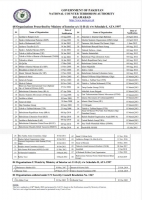
Editorial
Pakistan bans three more, raising the proscribed organizations to 76; but the problem remains
On 12 May, newspapers in Pakistan reported that three organizations from Sindh - Jeay Sindh Qaumi Mahaz-Aresar Group (JSQM-A), Sindhu Desh Revolution Army (SRA) and Sindhu Desh Liberation Army (SLA) were newly included into the list of proscribed organizations by the government of Pakistan.
Since 2001, Pakistan has been holding a list, in which it kept adding names that were considered as engaged in unlawful activities. Last year, in May 2019, eleven groups were added to the list; seven of them had links with the JuD, and the rest with FIF and JeM. ("11 groups banned for having links with JuD, others, Dawn, 12 May 2019, https://www.dawn.com/news/1481728). Earlier in 2019, the Jamaatud Dawa (JuD) and Falah-i-Insaniyat Foundation (FIF) were banned.
The sectarian organizations such as the Lashkar-i-Jhangvi and Sipah-i-Mohammad Pakistan tops this list, followed by militant ones from Balochistan. Some of the leading organizations fighting in J&K such as the LeT and JeM are also in the list. The Tehreek-i-Taliban Pakistan (TTP) was added in 2008.
However, the problem is the practice. Though these organizations are banned legally, most of them remain active and operate in the public. In 2015, the then interior minister, Chaudhry Nisar Ali Khan was reported to have announced that in Punjab alone, there were 95 organizations that were active. ("95 banned groups active in Punjab," Dawn, 15 January 2015, https://www.dawn.com/news/1157108). The reason was simple. Some parties find them useful and politically expedient. Dawn quoted a source: "all these militant outfits have been present in Punjab for quite some time, but instead of acting against them, the PML-N preferred to cohabitate with them."
So does the Deep State, for external reasons in Afghanistan and India.
Many of these groups are active online. In 2017, an investigation carried out by Dawn, details the list of groups that are active in the social media. According to the report, "while some of the Facebook pages and groups claim to be 'official' representatives of the outfits, others appear to be managed by members and supporters in ideological agreement." ("Banned outfits in Pakistan operate openly on Facebook," Dawn, 14 September 2017, https://www.dawn.com/news/1335561)
The bigger problem is the investigation and judicial trial. The recent (April 2020) change in sentencing Omar Saeed Sheikh and the release of others in the case of killing of Daniel Pearl, the Wall Street Journal in 2002 would highlight the problem in Pakistan. ("Pakistani Court Overturns Murder Conviction in Killing of Wall Street Journal Reporter Daniel Pearl," The Wall Street Journal, 2 April 2020, https://www.wsj.com/articles/pakistani-court-overturns-murder-conviction-in-killing-ofwall-street-journal-reporter-11585805394?cx_testId=3&cx_testVariant=cx_2&cx_artPos=3#cxrecs_s). The Pearls parents are continuing their fight demanding justice.
Another problem is the transparency. Last month, the Wall Street Journal also reported on Pakistan removing around 1800 names from the list of 7600, who were a part of the proscribed persons list maintained by Pakistan's National Counter Terrorism Authority (NACTA). On what basis did the government decide to cut the names drastically has been questioned by many. ("Pakistan Removes Thousands of Names From Terrorist Watch List," The Wall Street Journal, 20 April 2020, https://www.wsj.com/articles/pakistan-removes-thousands-of-names-from-terrorist-watch-list-11587393001)
Equally important issue is related to criminal justice system. A few days earlier, the Islamabad High Court made a scathing attack on the subject; the Chief Justice Athar Minallah was quoted to have stated it as "a reflection of the apathy, neglect and mis-governance of the past seven decades and no organ of the state can absolve itself from being responsible." (Unequal Justice, Dawn, 7 May 2020, https://www.dawn.com/news/1555181/unequal-justice). In another instance, the same Court also questioned on investigation training and the code of criminal procedure. ("IHC seeks explanation over delay in enforcing 2002 police reforms in capital," Dawn, 9 May 2020, https://www.dawn.com/news/1555709)
Finally, the real problem is the cosmetic nature of the government's attempts. In 2001, when the government started the proscribed list, there was so much pressure from the US, after the 9/11. During the recent years, the FATF discussions and the threat of Grey List weighs heavily within Pakistan to be seen as taking actions against the groups.
Why is the State reluctant to take actions against all the militant groups that it has proscribed? It is another discussion.
In Focus
By Lakshmi V Menon & Abigail Miriam Fernandez
Government assures the Opposition on not scrapping the 18th amendment
On 12 May, Foreign Minister Shah Mehmood Qureshi assured the Senate and the Opposition that the federal government will not scrap the 18th Constitutional amendment and pointed out that PTI did not enjoy two-thirds majority to do so unilaterally. He said the amendment's 'positive' features were acceptable to the Centre but the 'weak' parts required revisiting.
Earlier, the Information Minister Mr. Faraz spoke of the need for "unanimity and implementation" between provinces (Sindh) and Centre to tackle the pandemic and said the 18th amendment obstructed the formation of such a uniform policy and limited the Centre's role to issuing policy guidelines. Pakistan had been mired in debates regarding the scrapping of the 18th amendment ever since.
The Opposition fears that any alteration to the amendment would lead to the dwindling of provincial autonomy on various facets the NFC allows. The current debate is a result of the discrepancies between provinces and the Centre regarding the Covid-19 lockdown; in particular with Sindh. It is a PTI-PPP strife. The Opposition believes that the Centre would tamper with the amendment to purposely reduce provincial autonomy that has won PPP political mileage.
The 18th amendment, passed by the National Assembly in 2010, converted Pakistan from a semi-presidential state to a parliamentary republic. It enhanced provincial autonomy and dissolved the President's power to unilaterally declare emergency in any province. (Dawn, https://www.dawn.com/news/1556720/no-plan-to-scrap-18th-amendment-fm-qureshi-assures-senate)
An editorial criticizes the National Assembly session as a waste of time, money and an opportunity
An editorial in the Express Tribune is critical of the National Assembly that went into a three-day session on 11 May to hold a debate on how the government should respond to the coronavirus pandemic and deliberate on a plan of action to combat the issue. However, nothing fruitful came out of the three-hour discussion of the government's coronavirus policy.
The house witnessed nothing but political attacks and counter-attacks as usual, with speeches full of allegations and counter-allegations, each blaming the other.
Further, the meeting also entailed debates between senior members and newbies. The Opposition targeted the federal government's incompetence of handling a serious crisis and further highlighted the discord between the Centre and provinces.
The editorial points out that as the assembly session continues, the members should make the most of this opportunity and become fully involved in a serious debate to address the issue at stake. (The Express Tribune, https://tribune.com.pk/story/2220059/6-na-session/)
In Brief
By A Padmashree & P Harini Sha
COVID-19
379 overseas Pakistanis test positive for Coronavirus
Around 300 plus repatriated Pakistani nationals from various countries were tested positive of Coronavirus. Around 4,300 overseas Pakistanis returned home through the special flights between 29 April and 8 May were tested and quarantined. Majority of them returned from Dubai are carrying Coronavirus. 760 test results of Pakistanis arrived from Dubai on 10 May are still awaited. (Dawn https://www.dawn.com/news/1556718/379-repatriated-pakistanis-test-positive-for-virus )
Relaxing the restrictions is a "dangerous gamble": Analysis
Zahid Hussain, a senior journalist argues in his column in Dawn that the sight of multitudes rushing in market places and roads frightens while the curve of Coronavirus continues to rise rapidly. It highlights that the federal leadership has relaxed restriction without a proper lockdown at least for two months and denied the seriousness of this crisis. Moreover, he expresses it worrisome over the tensions between Sindh and center as well as the blame game in the National Assembly as political anarchy and policy disarray threatening the country. (Dawn https://www.dawn.com/news/1556767/a-dangerous-gamble )
BALOCHISTAN
Tribal feuds are a major hurdle to develop Balochistan, says the former Prime Minister
The Prime Minister in a tribal jirga stated that the tribal groups were creating a burden on the economic development of Balochistan. He stated that "All Baloch tribes should shun their differences and unite for strengthening brotherhood and harmony, instead of indulging in tribal disputes". (Dawn, https://www.dawn.com/news/1556724/ex-pm-jamali-calls-for-end-to-tribal-feuds)
SINDH
Bilawal Bhutto wants an apology from Qureshi on latter's remarks on PPP and Sindh
The Foreign Minister was quoted to have said that Sindh belonged to both the parties and his government will progress in Sindh. He also stated that "This is not the PPP of the past, which was a symbol of the federation. Today, I sense the roots of provincialism in the party". In response, the chairman condemned saying that he was blamed when his party tried to make a move towards Sindh. An upset Bilawal responded and asked for Qureshi's resignation: "I want the [foreign] minister to take back his words. If he can’t take it back, then resign. Such statements are damaging the federation" (Dawn, https://www.dawn.com/news/1556727/bilawal-blasts-qureshi-over-anti-ppp-remarks)
ECONOMY
Car sales drop to zero in April 2020
Last month turned out to be the worst for the auto sector as car production and sales were at zero. Although there were few register sales of some heavy vehicles and two/three-wheeler vehicles, production of the same remained nil due to the suspension of production and trading activities by the government because of the Coronavirus. (Dawn, https://www.dawn.com/news/1556738/zero-car-sales-in-april)
Sharp fall of industrial output in March
The large-scale manufacturing (LSM) output during March reduced drastically by 22.95 per cent due to industries shutting down amid the lockdown. The Pakistan Bureau of Statistics released data to show the impact of the global economic slowdown on the local manufacturers in March. With the lockdown being partially lifted these industries could resume their operations to fulfill international orders. (Dawn, https://www.dawn.com/news/1556736/industry-output-falls-sharply-in-march)
30 per cent decline in debt servicing
Data released by the State Bank of Pakistan showed that external debt servicing in the third quarter of the current fiscal year dropped by 30 per cent. Pakistan has paid 2.728 billion dollars in external debt servicing during this quarter. This debt servicing costs will continue to further stress the country's foreign exchange reserves despite a sharp decline in the current account deficit. (Dawn, https://www.dawn.com/news/1556735/debt-servicing-declines-to-272bn)
EXTERNAL
Chinese Ambassador to Pakistan calls on Army Chief
The Chinese Ambassador to Pakistan called the Chief of Army Staff to discuss mutual interest in regional security and issues of COVID 19 in the region. According to the ISPR release, "During the meeting matters of mutual interest including regional security issues and COVID-19 were discussed. COAS expressed gratitude for China's support related to immediate medical supplies and all other assistance including visit of Chinese medical experts to help Pakistan fight the pandemic. Visiting dignitary also re-assured China's continued support for Pakistan at all forums." (ISPR https://www.ispr.gov.pk/press-release-detail.php?id=5718 )
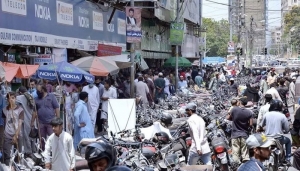
Editorial
Smart Lockdown, SOPs vs Social Realities
As a part of Imran Khan’s decision to ease the lockdown, markets across Pakistan opened on Monday. The government expected that the people and vendors would follow the Standard Operating Procedures (SOPs) issued by the government, as a part of “Smart Lockdown”. Available news and images on what had happened on Monday highlight an impending disaster.
Traffic was high on the roads. Markets were full of people. Social distancing was dumped as a result.
Expecting social distancing in traditional South Asian markets is asking for the moon. Unlike the huge new malls in the big cities, traditional markets and the shopping complexes of the 1990s and 2000s – are narrow lanes, with no space for people to maintain any distance. While cities like Karachi and Lahore may have new malls, but for regular provisions, people would be visiting the local markets.
People cannot be blamed. South Asians across the region are like this. The government should have expected it. Leading newspapers and analysts warned the decision to open sooner and leave the COVID fighting in the hands of the people would backfire. However, the government would not listen. Though Imran may say that he has eased the restrictions keeping in mind the miseries and starvation of poor and daily wage earners, it may be this very segment, that may now face the brunt.
His decision was political and perhaps economic, and not based on scientific grounds.
Dawn, in its editorial, reported, “the situation is already serious, and the reports from hospitals and doctors suggest that the situation will get worse. According to the Sindh health minister, there is a sharp increase in the number of patients “after every half an hour”, and the number of beds in high-dependency units across hospitals in the province are running short.” (Editorial, "A worrying gamble," Dawn)
Smart lockdown needs smarter governments and stronger SOPs. Else, the Second Wave will be staggering.
In Focus
By Lakshmi V Menon & Abigail Miriam Fernandez
Remittances record a six per cent increase during July-April FY20
On 11 May, the State Bank of Pakistan (SBP) data show that during the first ten months of FY20, the workers' remittances increased six per cent to $18.8 billion. SBP said the worker's remittances recorded a growth of $980.6 million concerning the corresponding period of the previous fiscal year. Until January, workers' remittances maintained a 4 per cent year-on-year increase in monthly average. However, April saw a 5.5 per cent decline in remittances compared to March. SBP added that a pandemic-led decline in foreign inflows is expected owing to the global economic lull.
With major inflows from US, UK and GCC countries, particularly Saudi Arabia and UAE, remittances had maintained a nine-per cent compounded annual rate from 2014-19. Further, they grew in terms of local currency as the rupee depreciated more than 40 per cent over the same period.
Previously, due to oil fall and the pandemic, the World Bank had projected a decrease in remittances to Pakistan in FY20, compared to FY19. The plummeting oil prices faced by oil producing nations and pandemic lockdowns in Saudi, UAE, UK and USA (countries from where 80 per cent of total remittances come) may cause a substantial drop in remittances.
(The News International)
NA session meets on COVID; the government and opposition end up in a blame game
The National Assembly, which met on 11 May after a period of two months, witnessed nothing but political attacks and counter-attacks. Further, the meeting also underlined the distancing between the Centre and provinces, especially Sindh over how the pandemic has been handled.
The opposition leaders blamed the federal government for their lack of support towards the provinces in fighting the virus and, their inability to come up with a national strategy to deal with the COVID-19 situation. However, the Foreign Minister and others defended the Centre's actions and blamed the opposition's non- cooperation for the current situation. PM Imran Khan's absence was also a question that was raised.
PPP chairman stated that this crisis had exposed the inefficiency of their prime minister, adding that the federal government should have stood along with the provinces in fighting this pandemic. Further, other ministers also expressed their dissatisfaction with the way the government was treating the pandemic.
Gen Bajwa discusses border security with Iranian counterpart Maj Gen Bagheri
Pakistan's Chief of Army Staff held a telephonic conversation with Iran's Chief of Army to discuss the matter of border security and COVID-19 situation. The two commanders spoke about enhancing security measure on both sides of the borders and also discussed ways to ensure how border terminals could be improved with the Covid-19 situation. Further, as reported by the ISRP, Bajwa stated that Pakistan continues to desire for regional peace and stability on the basis of mutual respect, non-interference and equality. Pakistan has started fencing the border but will require mutual bilateral cooperation to ensure border security. (ISPR)
The meeting between the two comes amid the rise in attacks along the Pak-Iran border, most recent being the attack on 9 May in which six security personnel were killed in an IED blast. The security personnel were returning from their routinely patrolling when their vehicle was hit by an IED detonated by remote control close to the border. This matter was also discussed by the two commanders.
Importing medicines from India snowballs into an issue
PM Imran Khan directed to investigate the import of over medicines from India. Previously, Pakistan had suspended all trade with India in August 2019 following the Indian government's revocation of the article 370. A Ministry of National Health Services (NHS) document shows 450 medicines are imported from India, including vitamins, salts and drugs.
However, due to growing appeals from Pakistan's pharmaceutical industry, Islamabad initially relaxed the ban to allow the use of already imported goods and materials from India. Later, to ensure the availability of life-saving drugs, Islamabad removed the ban on a wide range of medicines and raw materials imported from India. This policy shift was to avoid a severe shortage of life-saving drugs. However, allegations that all types of medicines, including vitamins and others, were being imported from India in the name of "life-saving drugs" arose.
It is reported that 95 per cent of drugs manufactured in Pakistan were using imported raw materials from India, China and Europe; where Indian share accounts to 50 per cent. Owing to this heavy reliance, on 11 May, representatives of the Pakistan Pharmaceutical Manufacturers' Association warned against the banning of medicines and raw materials from India. They also cautioned that any such action could possibly lead to shortages, price-hikes and weaken Pakistan's ability to counter Covid-19.
As per the NHS document, Pakistan currently imports vitamins, such as B1, B2, B6, B12, D3, Zinc Sulphate Monohydrate, various vaccines including Polio, BCG and Anti Tetanus Vaccine, drugs for cancer patients and many more life-saving drugs and raw materials from India. (Dawn, 12 May 2020 & Dawn, 12 May 2020)
In Brief
By Harini Sha and A Padmashree
COVID-19
People ignore SOPs on the first day after lifting the lockdown; 1,312 new virus cases, 30 deaths reported in 24 hours
The News reported on the failure of the people to stick down to the lockdown. According to the report, "most of the shopkeepers, as well as buyers, seemed throwing caution to the winds as far as observance of the standard operating procedures (SOPs), set by the government for opening of businesses for Ramazan shopping." (The News International)
The above is worrying, as the numbers keep increasing. According to Dawn, on 11 May (Monday), the total number of Covid-19 cases was over 31,700 on Monday, and the deaths touching 700.
Chinese provinces Shandong, Jiangsu, and Ningxia donate PPE for Punjab province.
Three provinces of Chine - Shandong, Jiangsu and Ningxia have donated personal protection equipment (PPE) worth Rs100 million. It includes protective suits, N-95 and surgical masks, gloves and disposable medical protectors for medical professionals and janitorial staff. The News quoted the Chinese Consul General saying Pakistan is a trustworthy friend of China adding that helping the Pakistani brethren in an hour of trial is their duty (The News International, 12 May 2020)
PROVINCES
Peshawar blast left two traffic police and five more injured
Two traffic police and five more were injured in an explosion Peshawar, that was hidden near the electric pole and remote-controlled. (Dawn, 12 May 2020 )
The government of Pakistan bans two more separatist organizations in Sindh
The government has added the Jeay Sindh Qaumi Mahaz-Aresar Group (JSQM-A), Sindhu Desh Revolution Army (SRA) and Sindhu Desh Liberation Army (SLA) to the list of banned organizations. Since 2001, Pakistan has been maintaining a list of proscribed groups, that saw the adding new names into the list. They include organizations from Gilgit to Gwadar, and across all the four provinces. There are 76 organizations that are proscribed; Dawn's report has the complete list. (Dawn, 12 May 2020)
SECURITY
Baloch Liberation Army claims the attack near the Pakistan-Iran border
The explosion that took place near the Pak – Iran border has been claimed by the Baloch Liberation Army. (Dawn,12 May 2020)
The explosion took place on 8 May in the Jech district of Balochistan, where six security personnel were killed. It was close to Pakistan's border with Iran. (Dawn)
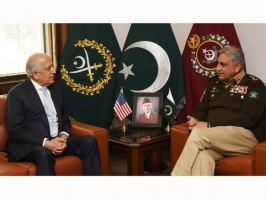
Editorial
Khalilzad meets Gen Bajwa: What is Pakistan’s Afghan Endgame?
On 8 May, Zalmay Khalilzad met Gen Bajwa in Islamabad, as a part of the US initiative to pursue the deal it has made with the Taliban in Doha earlier. What the US wants in Afghanistan, is clear; Trump wants to leave as early as possible, perhaps before the next Presidential elections and wants to leave chimaera of peace in Afghanistan between Taliban and the elected government. What does Pakistan want? More importantly, what does the Deep State in Pakistan wants in Afghanistan?
The fact that Khalilzad met Gen Bajwa shows who is in charge of Pakistan’s Afghan policy. Elected governments have abdicated their Afghan policy to the Deep State; or, the latter has usurped it from the former. And, perhaps, that is what the Deep State wants first; to be the deciding authority of Pakistan’s Afghan policy, than the Parliament. It would be a different discourse, why the Deep State is keen to take the lead.
In the context, what else does the Deep State wants in Afghanistan? It would want the US to leave as early as possible so that there are no foreign actors, who would cushion what it would want, and how it works with and work through the Taliban. Though Khalilzad has met the military leadership in Pakistan repeatedly over the US exit, there were numerous times, when the US and Pakistan forces were at each other. Successive US military leadership in Afghanistan have made this point.
An American exit in Afghanistan means, the ground is open for its play. An independent Kabul would be an anathema for Pakistan. With the spread of the Pashtun movement through the PTM not only in KP but also in rest of Pakistan, the Deep State sees it as a conspiracy from its western border. Perhaps, it suspects that there is a New Delhi-Kabul collusion, and the PTM is an expression. An independent and elected government in Kabul also means more space for India in Afghanistan; another anathema for Pakistan.
Finally, the Deep State would prefer a Taliban rule from Kabul, than a secular and liberal Afghanistan. This is a part of how the Deep State looks at even Pakistan internally. The Deep State fears that a liberal, secular and democratic Afghanistan would undermine its interests across both sides of the Durand.
In Focus
"How an aggressively Hindu India poses a problem for Islamabad": Analysis by Shahid Javed Burki
The analysis by one of the most respected columnists – Shahid Javid Burki, though does not highlight on how it poses a problem for Islamabad (perhaps the title was a misnomer), it presents three-pointers on how Pakistan looks at Modi and BJP’s policies. First, Modi is pursuing a policy of exclusivism, as he sees the country as a Hindu India, where the other faiths should play a secondary role. Second, his Kashmir policy has provided a larger space to the Indian military in J&K. Third, Modi is attempting to impose Hindutva in Kashmir, which would be repealed.
A learned scholar like him makes the same cardinal mistake that others in Pakistan have made – that the Kashmir uprising in the 1980s was based on Islamic nationalism. What he also misses is the growing divide between the three regions – Jammu, Kashmir and Ladakh, where there is a religious wave, pulling the State into different directions. (The Express Tribune, 11 May 2020, https://tribune.com.pk/story/2218509/6-aggressively-hindu-india-poses-problem-islamabad/)
Life of a journalist in perpetual peril, says the Express Tribune in its editorial
Referring to a recent attack on a journalist who is working with the Dawn, the editorial looks at the more significant problem facing the journalists in Pakistan. It says, “journalists who dared to broach subjects deemed off-limits have been subjected to harassment campaigns. It goes on to describe how journalists continue to be at risk in the field, especially in Balochistan and Khyber-Pakhtunkhwa, where reporters are caught in the crossfire between the security forces and militants.” (The Express Tribune, 11 May 2020, https://tribune.com.pk/story/2218483/6-in-perpetual-peril/)
The threat comes from both the State and non-State actors. Recent indexes and reports on media freedom in Pakistan have placed Pakistan at a lower place. For example, the World Press Freedom Index by the Reporters Without Borders considers Pakistan at 145, out of the 180 countries. Afghanistan, Bhutan, Maldives, India, Nepal and Sri Lanka are placed better from the region, except Bangladesh, which is behind Pakistan.
In Brief
By A Padmashree & P Harini Sha
COVID-19
The total number of infected patients in Pakistan surge
In the global coronavirus position, Pakistan ranks 19 with a total of 30,346 patients. It has performed test for 13,341 in the last 24 hours, out of it 1,991 have tested positive. While in the region the most affected provinces are Sindh with 11,480 cases and Punjab with 11,093 cases. As of May 10, the fatality rate of the country stands at 2.16 with 21 new cases. (The News International)
'Smart' lockdown to contain Coronavirus
Pakistan further relaxes lockdown amid spiking Coronavirus where the country has recorder 200 deaths and more than 10,000 COVID positive cases in a week. The Centre is confident in using technology to identify COVID 19 hotspots ensuring 'smart' lockdown to control local transmission and suggested patients to stay in their houses if confirmed. Sindh lifts lockdown with a fear of surging coronavirus cases and announced three days shutdown in a week. (Dawn)
"Pakistan's health system and health care providers are proving more resilient": Opinion
The health care providers are comparatively better in dealing the patients from the rest of the world due to many reasons. First, the flexibility given to the doctors to handle the patients with their experience. Second, adaptability to deal with the mass number of patients and emergency cases due to practice. Finally, the ability to recruit new resources in a short period. (Dawn)
Pakistan's health is chronically underfunded
Dawn's editorial comments on WHO's briefing on COVID 19 conditions where it urges the countries to invest in health care systems rather than scramble for solutions when the next pandemic arrives. It says Pakistan's health infrastructure is chronically underfunded and the outbreak of Coronavirus is an alarm to the country's leadership to prioritize its health budgets over defense expenditure. It points out, "the pandemic should be accompanied by the realization that health must be treated not as a privilege, but as a right". (Dawn)
"The government has left it to the people to ensure their own safety while the government looks for the other way": Opinion
An opinion in The News International highlights the economic condition of the population, where between three crores to seven crore people will go below the poverty line and about 18 million people will lose their jobs as a result of the economic impact due to the pandemic. Pakistan is facing a challenging situation to decide between health and economic conditions. The federal government has left it to the people to ensure their own safety while the government looks for the other way of containing the spread of the virus. It critically analysis the crisis by stating that Pakistan is far behind the flattening of the curve and in end, we achieve nothing than a worse hit due to pandemic. (The News International)
ECONOMY
Masks export providing a lifeline to the textile industry
The market demand of the textile industry that dropped down in the pandemic has taken a U-turn to produce textile masks. Experts have decided to produce the masks from woven material to attract the global consumer. The demand for masks has been predicted to surge even after the relaxation of lockdown. (Dawn, https://www.dawn.com/news/1556258/textile-sector-masking-its-way-forward)
"Only faith-based spending can take the risk of saving the economy": Opinion
The faith-based charity aids have helped the economy during the pandemic by saving the poor from hunger. The opinion on The News International insists that by institutionalizing these funds of charities would support and supplement the funds from the IMF for projects removing hunger and poverty. It comments that the pandemic has taught lessons that the mere growth of the economy does not make people prosper rather growing with shared prosperity. (The News International, https://www.thenews.com.pk/print/656947-how-to-save-the-economy)
INTERNAL
National Assembly to meet today on sessions to discuss COVID-19
The National Assembly is set to meet today, (May 11) under strict adherence to health guidelines to discuss the prevailing situation on coronavirus spread in the country. The physical session of the National Assembly was scheduled under the agreement of debating only on COVID-19 situation and suspend its entire routine agenda. The admission to the visitor's gallery is closed and only journalists are allowed in the Press Lounge. (Dawn, https://www.dawn.com/news/1556225/ritual-na-session-on-covid-19-impact-gets-under-way-today )
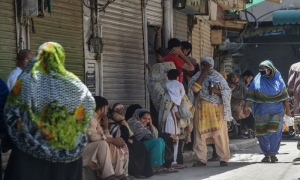
In Brief
COVID-19
With no regard for the SOPs, people were out for shopping; more than 1000 cases reported in Sindh alone in 24 hours
The News editorial a day before proves to be correct. It warned that the decision of Imran government to lift the lockdown would leave the fighting of Coronavirus to the people. And the same newspaper noted that without any regard for the SOPs, the people were seen shopping, with both shopkeepers and the buyers flouting them. During the last 24 hours, Sindh alone has reported more than 1000 cases. (The News)
Confirmed cases cross 30,000; and the deaths 640, as on 10 May
As on 10 May 2020, the confirmed cases of the Coronavirus in Pakistan has crossed 30,000. Sindh and Punjab are the worst affected, with both the provinces crossing 11,000 plus cases. Balochistan has the least number of cases; it is yet to cross 2000. KP has around 4500 cases, and Islamabad 600 plus. The two Kashmiri entities occupied by Pakistan – GB and AJK have 430 and 80 plus respectively. (Dawn)
INTERNAL
For Sindh, locusts are a bigger problem, after COVID-19
The locusts have become the biggest source of threat to the farmers in Sindh. According to a news report, more than 166,700 acres of land with crops have been damaged in Sindh alone. The desert locusts have been a menace for countries from eastern Africa to Rajasthan and Punjab in India. This year, it is a bigger problem, with the change in breeding seasons for the locusts. According to an Express Tribune report, the Chief Minister of Sindh, on 9 May has approved to the release Rs286 million and unfreeze another Rs132 million allocated to the agriculture department, to spray pesticides against the locusts. (The Express Tribune)
The News in its editorial says, Pakistan’s strategy “was not enough to demonstrate full commitment and convince the world community to remove it from the grey list” of the FATF
The Financial Action Task Force (FATF) was to meet in June 2020 to review the progress made by Pakistan in addressing the 27 points relating to terror financing and money laundering. During the last few meetings, Pakistan has escaped with an extension. During the last meeting, the FATF considered that there had been efforts towards progress only on 14 points out of the total 27. The next meeting of the FATF has been postponed because of the COVID-19, giving some breathing space for Pakistan. However, the News, in its editorial has warned: “But it (the postponement) should not prompt us into a gloating mode, as still there will be an evaluation of Pakistan’s progress.”
Tribute to Sajid Hussain, the Baloch Journalist who lost his life in Sweden
In a tribute to Hussain (In Memorium: The gem we lost in Sweden) Muhammad Akbar Notezai, recalls his early life and politics in Karachi, and also his writings in The News and the Daily Times, two English dailies in Pakistan. Notezai remarks on how the topics that he wrote on missing persons and drug trafficking in Balochistan has landed in trouble. “Feeling his life and safety were under threat, he left Pakistan on 25 September 2012, leaving behind his wife and two young children.” Notezai’s tribute underlines the threats faced by journalists (from both State and non-State actors), and their sacrifices.
AFGHANISTAN
Chaman border reopened to allow 3000 Afghans to return home
Close to 3000 Afghans who were stranded in Balochistan were allowed to return to Afghanistan through the Chaman border. According to a news report, these Afghans have entered through Pakistan without proper travel documents through multiple entry points, using the Afghan national identity cards. Similarly, more than 450 Pakistanis who were stranded in Afghanistan returned home. (Dawn)
The US seeks Pak help in starting the intra-Afghan dialogue, says the News International
Referring to a statement by the US embassy in Islamabad, the News reported: “Ambassador Khalilzad discussed ongoing efforts by the United States to advance the Afghan peace process and sought Pakistan’s support in pressing for a reduction in violence, the immediate start of intra-Afghan negotiations, and assistance in helping obtain the freedom of American Mark Frerichs. Pakistan’s military leaders reaffirmed their support for US efforts.” On 8 May, US Special Representative for Afghanistan Reconciliation Zalmay Khalilzad met with Chief of Army Staff General Qamar Javed Bajwa.
ON INDIA
Pakistan continues its mission to raise the issue of J&K; it is Pakistan’s envoy to the UN at the Security Council now
Ambassador Munir Akram was quoted to have made a complaint against India at the UN Security Council. “The Security Council has the mandate to prevent and punish genocide, war crimes and crimes against humanity. It must act to prevent impending atrocities, including against the Muslims in India and in occupied Jammu and Kashmir.” According to him, “the BJP-RSS leaders are engaged in imposing what they themselves have called ‘a final solution’ — a plan to crush Kashmir’s quest for self-determination and freedom and colonize it into a Hindu majority territory.”
On Kulbhushan Yadav, “Pakistan has fully complied with the judgment and remains committed to continue doing so as the case proceeds further” says its foreign office
Responding to a lecture by Harish Salve, India’s legal counsel in the Jadhav case, Aisha Farooqui, spokesperson for Pakistan’s foreign office said that Pakistan firmly rejects the Indian Counsel point on Pakistan not complying with the ICJ’s judgment in the case as “baseless and inaccurate.” (The Express Tribune)
The News, refers to a British Kashmiri Conference to write India is shamelessly exploiting the crisis
As a part of providing larger space to anti-Indian news reports and developments in J&K, one of leading newspapers – the News, gave one-fourth of a page to cover a video conference in London by the Kashmir Youth Assembly (KYA) and the Organisation of Kashmir Coalition (OKC). These organizations in Europe, though address their resolutions against India and Pakistan, the focus is primarily in what is happening inside J&K, and not on what is happening in those territories under Pakistan’s occupation.
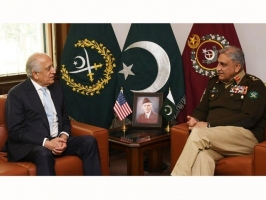
In Brief
By Abigail Miriam Fernandez
COVID-19
Record COVID-19 spike in a single day
Pakistan has seen a record rise of 2000 new cases on 8 May, just a day before easing down of the lockdown. With the number of cases increasing, the Punjab and Sindh government have asked for an extension of the lockdown restrictions. However, the federal government has urged people to follow the standard operating procedures (SOPs) that have been put in place. (Dawn)
"By hoping, the virus will not be contained": Editorial
The News International, in its editorial, feels that the people are left to their own to fight the COVID-19. It argues, "since the first case of Covid-19 emerged in Pakistan, and a lockdown of sorts was partially imposed across the country in March – most stringently of all in Sindh – we have been left essentially on our own to grapple with the world's biggest crisis in recent times. Is this matter not too serious to be left to the people alone?"
The editorial concludes with a warning: "The virus is not a joke. Medical specialists warn that things could worsen very quickly. There could be a massive storm ahead, pulling into its epicentre thousands of people. Do we want this?"
Bilawal says, Sindh is not ending the lockdown on Monday, and counters the media report that the CM has agreed to lift the curb
Imran Khan, after the meeting of the National Coordination Committee on Thursday (7 May 2020) announced a phased lifting of the lockdown within Pakistan. Following that, there have been reports that Sindh has also agreed to lift the lockdown agreeing with the Centre.
However, Bilawal Bhutto, the President of the PPP refuted that Sindh is going along with Sindh. He tweeted: "Sindh Chief Minister Syed Murad Ali Shah has categorically said that Sindh was not ending the lockdown on Monday and "we are entering the second phase of lockdown with some extra restrictions, particularly at hotspots."
The Centre-Sindh differences on lockdown has been one of the most significant setback in fighting COVID-19 within Pakistan.
Pakistani students in Wuhan to be repatriated
More than 1000 Pakistani students who are stranded in Wuhan will be repatriated by special four special Pakistan International Airlines (PIA) flights. These students have been stuck in Wuhan since the breakout of the coronavirus. A foreign ministry spokesperson stated that these students have been "very patient and brave" during this difficult time. (The Express Tribune)
INTERNAL
Major and five soldiers killed in an IED blast near Iran border
A major and five soldiers were killed in Buleda near the Pakistan-Iran border. The security personnel were returning from their routinely patrolling when their vehicle was hit by an improvised explosive device (IED) detonated by remote control close to the border. (The News International)
A day earlier, there were attacks on the security forces in North Waziristan, in which two soldiers were killed.
"Limited access to technology means that millions of students who cannot hop online will be left out", says Dawn's Editorial
This new age of digital learning amid this pandemic will be a huge challenge in developing countries like Pakistani due to the lack of technical support and already existing structural inequalities leaving many students to drop out or simply not have access to this new system of remote learning. Further, the editorial sheds light on how the government would need to take measures to address this matter. (Dawn)
Islamabad High Court continues its crusade on the criminal justice system in Pakistan
The Islamabad High Court (IHC) issued a written order on 8 May questioning why the Police Order 2020 has not been implemented. According to the IHC, it is an important mechanism for the criminal justice system response and effectiveness. The court issued that "is being resisted for reasons that are required to be explained and justified by the federation as well as the administration of the Islamabad Capital Territory (ICT)". (The Express Tribune)
A few days earlier, in a different case, the IHC issued a scathing verdict on reforming criminal justice system by proposing a policy to conclude criminal appeals within three months in order to shorten the duration that these cases otherwise run for.
Dawn on the formation of National Commission for Minorities
Dawn, in its editorial, looked inwards to identify the major problems facing the issues in Pakistan, forming a National Commission for Minorities. It read: "The problems surrounding the formation of the body simply reflects how far we are from becoming a truly equitable society in letter and spirit. While we rightfully condemn the cruel treatment that minorities — particularly Muslim minorities — in many other parts of the world are subjected to, we turn a blind eye to the abuse taking place under our watch or go into denial and get defensive about our own poor track record."
EXTERNAL
Gen Bajwa extends support to the Afghan Talks
Chief of Army Staff, Gen Qamar Javed Bajwa conveyed to the US Special Envoy for Afghan Reconciliation Dr Zalmay Khalilzad that Pakistan's "support towards peace process is a manifestation of our goodwill towards the cause". (Dawn)
Supreme Court on Gilgit-Baltistan Polls
On 8 May, the Supreme Court stated on the federal government's appeal which sought to amend the Government of Gilgit-Baltistan Order 2018 to conduct the upcoming general elections and the creation of a caretaker government during the interim period. The court stated that "We expect that the caretaker government shall comprise of highly respected persons with a proven track record of high levels of integrity, impartiality, uprightness, and competence" (The News International)
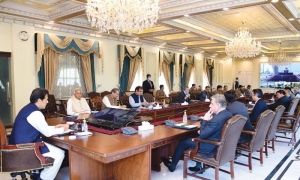
Editorial
Imran Khan decides to ease the lockdown; but, the cases are increasing
The National Coordination Committee (NCC), finally met on Thursday (7 May 2020), and decided to ease the lockdown in a phased manner. Unfortunately, the decision comes at a crucial time, when the cases of COVID-19 are increasing along with the casualties.
According to a Dawn report, the count on the previous day has been the highest with 1300 cases with 48 deaths. This mean, Pakistan has decided to lift the lockdown, even before the COVID-19 curve could flatten.
What is the hurry? To start with, Imran Khan from the beginning was not in favour of imposing the lockdown. He even tried distance from the idea, calling it an elite one. Perhaps, like Trump and Bolsonaro in the US and Brazil, respectively, he does not understand the intensity of the problem. Alternatively, the economic and business interests weigh more than the safety of his people. The business community in Pakistan have been pressurising the government for an early lifting.
Besides the health problem, Imran Khan also has a political problem in taking the decision forward. The federating units, especially Sindh, is not in favour of the lifting. Balochistan has extended the lockdown. This would mean, the federal movement would be difficult.
Imran is also expecting that there would be a better discipline in the civil society in following the Standard Operation Procedures (SOPs). He even made a comparison with Germany, on how it has been a success story, because of strong discipline. Are the South Asian societies known for self-discipline and following SOPs?
This is a gamble, in the name protecting the weaker segments – including the daily wagers, labourers and small shop keepers. Let us hope Imran Khan has made the right decision.
Judicial Commission complains against the Ministry of Religious Affairs of non-cooperation, on the question of protecting the minorities
Following strong criticism from the human rights organisations in Pakistan against the nature of the proposed National Minorities Council, the Judicial Commission also has complained to the Supreme Court on the same issue.
For the Judicial Commission, the formation of the National Minorities Council based on a decision by the federal cabinet is against the directive given by the Supreme Court to make it as a Statutory body, through a Parliamentary resolution.
In 2014, Justice Tassaduq Hussain, the then Chief Justice of the Supreme Court (2013-2014), delivered a landmark verdict on the bombing of a Church in Peshawar. One of the primary directives of the verdict was to form a National Council for Minorities, that would provide rights to the minorities, protected by the Constitution.
In 2019, under Justice Asif Saeed Khosa, who was also the Chief Justice of the Supreme Court (2019), a Commission was formed to follow up with the government on the implementation of 2014 directive by the Supreme Court.
According to a Dawn report, the Commission formed by the Supreme Court submitted a draft bill in April 2020 after consultations to the Ministry of Religious Affairs. There was neither a response from the ministry to the Commission, nor a broader debate on the draft bill. Instead, it came up with its own decision to set up a Council for minorities based on a discussion in the federal cabinet.
According to the report submitted by the Commission to the Supreme Court, "The body proposed by the religious affairs ministry violates the commitment made before the apex court on Feb 19, 2020, as it does not have a statutory backing and its very existence and composition will be at the whims and mercy of the ministry." (Dawn)
A day before, human rights organisations have also made a similar complaint against the new minorities council, that does not have statutory support.
In Focus
By Abigail Miriam Fernandez
Violence continues in North Waziristan, as two soldiers killed
Two Pakistani soldiers have been killed in a rocket attack targeted at a security checkpoint near Mirali town in North Waziristan.
This incident comes amid the rise of violence in Waziristan. Over the past few weeks, there have been several reports of targeted killings and attacks on civilians and security forces with numbers increasing each day.
A few days earlier, a prominent PTM leader Arif Wazir was killed by unidentified gunmen. Civilians were also shot dead in Mirali and Tapi over the last few days. Dawn stated in one of its recent reports: "The rise in targeted killing of civilians and attacks on security forces in North Waziristan and South Waziristan districts have created fear among the local population."
In Brief
By A Padmashree & P Harini Sha
INTERNAL
CPJ urges UN to act for the security of Journalists
The New York-based Committee to Protect Journalists (CPJ) along with 191 partner organisations called for the security of journalists amid COVID-19 spread, urging the United Nations secretary-general to act. The editorial in The News International expressed its discontent on the lack of freedom to press and the threat faced by the journalists in Pakistan. It points out the detention of the editor-in-chief of the Jang group in Pakistan and the political prisoners who are held for voicing out their opinions and the need for a free press in the time of world crisis. (The News International)
Khalilzad to hold talks with Pakistan after meeting Taliban in Qatar
The United States special envoy on Afghan Reconciliation, Zalmay Khalilzad is scheduled to meet the officials in Pakistan. He would hold a meeting with the Taliban negotiators in Doha, and then the officials in New Delhi. (The News International)
32 million rupees worth properties of Taliban confiscated in Karachi
An anti-terrorism court has confiscated the properties worth 32 million rupees in Karachi. According to a news report, these properties belonged to the Taliban leader Mullah Akhtar Mansour. (Dawn)
ON INDIA
Foreign Office Spokesperson accuses India of "illegal actions" and "inhuman practice".
Aisha Farooqui, the foreign office spokesperson, in her weekly review has objected to the recent developments within Kashmir Valley. She said: "While sensitising the international community about such a possibility, we have consistently urged India to refrain from any ill-considered and irresponsible move which could have serious implications for peace and security in the region," (Dawn)
Quote of the day
“We have to collectively discipline ourselves as a nation to save ourselves from the virus as well as earn livelihood for our families. There is a greater responsibility on citizens to strictly follow SOPs and precautionary measures”
- Imran Khan, on lifting the lockdown
“The body proposed by the religious affairs ministry violates the commitment made before the apex court on Feb 19, 2020, as it does not have a statutory backing and its very existence and composition will be at the whims and mercy of the ministry”
- Judicial Commission on the National Minorities Council announced by the Ministry of Religious Affairs
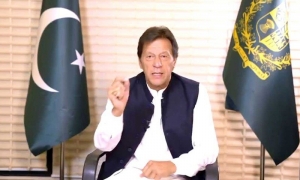
Punjab's bickering with the PIA leaves 100 million rupees worth PPE, donated by China lying in Beijing airport
700 boxes of Personal Protective Equipment donated by China, worth 100 million rupees is lying at the Beijing airport. The PPE was handed over to the Pakistan embassy in Beijing, which has transported to the Airport 45 days ago. However, the boxes could not be brought to Pakistan, as Punjab government and the Pakistan International Airlines (PIA) are fighting over the freight charges. Items that were donated by China include "protective suits, surgical masks, N-95 respirators, medical gloves, disposable medical protective clothing, among others, for frontline workers including doctors, nurses, and paramedical staff." (The Express Tribune)
Independent groups working on minority and human rights reject the National Council for Minorities formed by the government.
On 5 May, the federal cabinet announced the formation of a National Council for Minorities, with representation from Hindu, Christian, Parsi and Kalash communities, but minus the Ahmadiya. Peter Jacob, the Chairman of the Peoples Commission for Minority Rights Chairman Peter Jacob, has made a statement toward challenging the Council, as it was formed by a decision based on the federal cabinet and not an act of Parliament. For him, this would be a contempt of the court and also a violation of the 2014 order by the Supreme Court. Hina Gilani, one of the founders of the HRCP and a former UN Special Representative of the Secretary-General on Human Rights Defenders has been reported to have supported the action.
Dawn says, "what often passes for 'investigation' is planted evidence, confessions under torture, etc"
In its editorial, responding to a recent verdict by Chief Justice Athar Minallah of the Islamabad High Court on reforming the criminal justice system in Pakistan, Dawn has commented on the limitation of the Courts on the issue. According to the editorial, the judges rely on the evidence presented before them, hence there is a need for a larger reform on the police investigation. It has called for "simultaneous reforms in the functioning of the police can there be any improvement in the dispensation of justice."
Targetted killings continue in North Waziristan
Five were killed in two separate firing incidents in North Waziristan. The killers remain unidentified. On 2 May, Arif Wazir, a leading figure in the PTM was gunned down in front of his house by unidentified gunmen in Waziristan. According to a news report in Dawn, "The rise in targeted killing of civilians and attacks on security forces in North Waziristan and South Waziristan districts have created fear among the local population."
Pakistan to resume limited flight operations
The minister of Aviation in Pakistan has hinted that Pakistan would resume limited domestic flight, due to the public demand. The flights would operate from four airports — Karachi, Islamabad, Lahore and Quetta. (Dawn)
Pakistan wants international cooperation in fighting the Locusts
While the Locusts have been a problem for Pakistan, its impact has increased manifold recently. It was reported earlier that 38 per cent of the Pakistani territory was breeding ground for the locust, with Balochistan facing the brunt (60 per cent), following by Sindh (25 per cent) and Punjab (15 per cent). According to a news report, the problem has aggravated now, because of an "unprecedented third generation breeding" instead of the regular two breeding seasons. (Dawn)
The National Coordination Committee to decide today about continuing with the lockdown
Chaired by the Prime Minister, the National Coordination Committee (NCC) will decide on the continuation of the lockdown. With the Prime Minister is not in favour of the lockdown, it is expected that the country would lift partially, as the business community has been complaining about the losses. The PM has earlier criticised the "elite" for favouring the lockdown.
Quote of the Day
"I have been warning the world about India's continuing efforts to find a pretext for a false flag operation targeting Pakistan."
Imran Khan (The News)
"There is no political hindrance in its way. The project (CPEC) is Pakistan's future as well as a tangible reality and no compromise will be made on it"
Lt-Gen (retd) Asim Saleem Bajwa, Chairman, CPEC Authority (The Express Tribune)
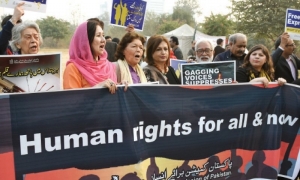
Editorial
Pakistan to constitute the National Minorities Commission. Qadianis won't be a part of it.
The federal cabinet, according to the Minister for Religious Affairs has decided to finally constitute the National Commission for Minorities. While the other minorities of Pakistan would be a part of it, the Qadianis would not be a part of it. The previous Commission had expired.
According to the News International, the Commission would have a Chairman and two Maulanas as unofficial members. There would also be members of Hindu, Christian, Sikh, Parsi and Kalash communities. The official members of the Commission would include the Chairman Council of the Islamic Ideology (CII) and one representative each from the Ministries of the interior, law and justice, human rights and federal education. The Federal Secretary of Religious Affairs will remain its ex-officio member. (The News International).
During the recent weeks, news reports were hinting that the Qadianis would be a part of the NMC. News reports even suggested that the Prime Minister was in favour of the inclusion. But, the latest report repudiates that. There has been strong opposition to the idea; Chaudhry Shujaat, the President of his faction of the PML, for example, was reported to have stated: "The opening of Pandora's box of Qadianis is beyond understanding. Neither the Qadianis accept themselves non-Muslim minority nor do they accept the constitution of Pakistan. Under these circumstances, the favouring of Qadianis is a joke with Pakistan, which is unacceptable." The Qadianis were constitutionally declared as non-Muslims in 1974.
The Human Rights Commission of Pakistan has repeatedly been emphasizing on the need to have an effective minorities commission. The Supreme Court of Pakistan in June 2014 passed a landmark judgement to protect the rights of the minorities. In October 2019, the Supreme Court revisited the issue in another case and decided to constitute a special bench to implement its 2014 judgement.
While the government's move to constitute the Commission on minorities should be welcome, its exclusion of the Ahmadiyya community shows the deep fault lines with the society. It is just not the State, but also the society, that should take the blame for the exclusion. The former is attempting to appease the latter; and in the case of Qadiyanis, the latter act as the final arbiter.
In Focus
By Lakshmi V Menon & Abigail Miriam Fernandez
Daniel Pearl's parents make an appeal
On 6 May, Ruth and Judea Pearl, parents of the late Wall Street Journal reporter Daniel Pearl, appealed to the masses in Pakistan through a touching note published by Dawn.
In 2002, Omar Sheikh, Fahad Nasim, Syed Salman Saqib, and Sheikh Muhammad Adil kidnapped Daniel Pearl in Karachi, demanded ransoms from the US such as F-16 fighter jets and the freeing of Pakistani prisoners from Guantanamo Bay; days later Daniel was brutally murdered. The four perpetrators were convicted in 2002. However, in 2020, the Sindh High Court overturned the ruling and suggested they must be let free. Daniel's parents filed an appeal to the Supreme Court of Pakistan against the SHC's ruling, demanding the criminals must remain behind bars.
Daniel's parents say the SHC's verdict sends the wrong message to potential terrorists and violent extremists and jeopardizes the safety of citizens and journalists in Pakistan, and call for action against injustice. They remind Pakistan of the global attention the case has garnered and warn the State's adjudication and Pakistani courts' dispensing of justice must be done cautiously.
Exports dropped 54 per cent due to lack of global demand.
There has been a steep fall in exports in the month of April. Data released by the Pakistan Bureau of Statistics shows how disruptive Pakistan's international trade has been due to the global economic slowdown. The decline in the value of imported goods in April is 34.49pc resulting in narrowing the trade deficit.
This decline has been caused by several other factors such as the closure of shipping lines, due to which there was a 27 per cent drop in the arrival of export cargo containers; some of which are currently confined at Karachi ports because of the restrictions in shipping. Further, exports through land have also not been functioning due to borders been closed thus, resulting in the decline of demand for export.
The situation has left exporters with a multitude of problems due to delayed payments and halt of shipments to Europe, the US, China, the EU, UAE, and Saudi Arabi. Further, exports to Iran and Afghanistan were restricted due to the lockdown.
In Brief
By A Padmashree & P Harini Sha
COVID-19
Cabinet decides to relax lockdown restrictions.
The federal government approved to relax restrictions in Pakistan after 9 May. This move will allow daily workers to earn under controlled measures amidst the virus outbreak. (Dawn)
Pakistan ranks 29th in the list with 500 death cases.
Pakistan ranks 29th now with total deaths of 500. The Executive Director of the National Institute of Health has estimated the total cases to go up to 150,000 in May. He further stated that the curve is expected to flatten after 30 May (Dawn)
Pakistan is facing challenge as workers return from the Gulf countries.
Pakistanis are returning from the United Arab Emirates (UAE) with a high rate of COVID-19 cases. Around 1.5 million Pakistanis are working in UAE and most of them are low-wage workers living in crowded housing have returned home through special arrangements. (Dawn)
Opinion: "The federal government is trying to score political points amid crisis"
Opinion in The Express Tribune says the conflict between the center and the province has called for intervention from the Supreme Court who is likely to pass an interim order to the leadership which is incapable of passing a uniform law to the thriving virus. (The Express Tribune)
Opinion: "Our muddled policy may cause greater damage"
An opinion in Dawn accounted that Pakistan's leadership looks at the lockdown as a 'cowardly' action that has brought disarray in policies to fight the pandemic which has driven misery to common people. The opinion is critical of the government's decisions to open up when it has not taken enough measures to contain the deadly virus. The article blames the federal leadership's whimsical approach as the biggest impediment in the measure to implement policies. (Dawn)
BALOCHISTAN
Balochistan reports highest Covid-19 cases in one day.
While Pakistan is planning to relax the lockdown, Balochistan reports the highest number of COVID-19 cases in 24 hours. On 5 May, the province reported 174 new coronavirus cases in a day which increased the total cases to reach 1,495. The Health Director of Balochistan reported that 89 per cent of COVID 19 cases are locally transmitted. (Dawn)
Lockdown extended further for two weeks in Balochistan.
The government on Tuesday has decided to extend the lockdown by an additional two weeks amongst the inner and outer city areas till 19 May. It was also decided to continue under Section 144 for Preventive measures. PPP chairman has stated that "only effective defence against coronavirus has proven to be isolation, social distancing and lockdown". (Dawn)
INTERNAL
National Assembly sessions resume from 11 May.
The main opposition party Pakistan Muslim League-Nawaz (PML-N) withdrew their requisition after the government announced its commencement of the National Assembly from 11 May. The government has also assured that no legislation would pass in the meantime that would favor the ruling party. (Dawn)
Quote of the day
" Our intention is very simple: to make certain that the four men responsible for our son’s murder remain behind bars so that all Pakistanis and journalists are safe. In losing Daniel, we found a new purpose for our lives. In our long personal journey of 18 years, we have built bridges with Pakistan."
- Parents of Daniel Pearl (Dawn)
"Today the religious minister has come up with a summary that suggested non-inclusion of any Ahmadi in the commission because they do not fall in the definition of minorities"
- Shibli Faraz, Minister for Information and Broadcasting (Dawn)
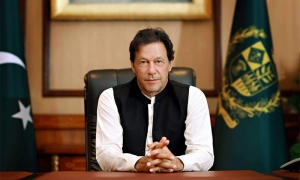
In Focus
by Abigail Miriam Fernandez & Lakshmi V Menon
Questions raised on the Government's decision to ease lockdown
The Government's decision to gradually ease the lockdown due to the economic condition has become a concerning matter.
An editorial in the Dawn is critical of the government move, given the alarming data of the scenario if lockdown is lifted. The decision to ease the restriction comes after the Planning and Development Minister addressed the unfavourable impact that the lockdown is having on the economy, where more than 18 million people could be left unemployed, 70 million people in the country might fall below the poverty line, and over one million small businesses might be forced to shut down due to the pandemic and lockdown.
Further, the Government has built its case by comparing Pakistan's low death rate to the rest of the world, stating that the coronavirus has not been as fatal in Pakistan.
There are several difficult questions to be answered. How prepared is Pakistan to respond and cope if there is a spike in infection? Should fighting the virus or addressing the economic issue be the priority of the Government now? Although, an extended period of lockdown would leave the economy in a pathetic state, at what cost will the easing down of the restriction come?
Pakistan accuses India of "whipping up a frenzy over alleged infiltration from Pakistan" and calls for a UN fact-finding probe
On 4 May, Major General Babar Iftikhar, the Director-General, Inter-Services Public Relations, speaking to a private news channel, rejected Indian claims of infiltration from their side across LoC into Jammu and Kashmir. He called them as a futile attempt by India to externalize the self-created dire situation in Kashmir and challenged Indian military and political leadership to furnish evidence.
He also said Pakistan was willing to comply to inspections by United Nations to prove Indian claims of terror launch pads and infiltration false.
The DG blamed the incumbent BJP government's 'saffronization' policies for causing the national unrest in India and alleged that blaming Pakistan as a means to shift global attention from human rights violations in India. The DG argued that infiltration by Pakistan was not possible due to UN Observes monitoring mechanisms, the three-tiered fencing apparatus along LOC and India's constant satellite supervision.
On the other hand, the media also had a field day accusing India. Dawn in its editorial, blamed India, and said that "it is imperative that both states assume a less threatening and more cooperative posture, as the Covid-19 pandemic knows no borders."
In Brief
By A Padmashree & P Harini Sha
Supreme Court directs the Federal Government to form a unified policy
The apex court headed by Chief Justice of Pakistan (CJP) has ordered the Government to frame a unified policy to combat the crisis. From its observation, the lack of a coordinated policy by the Federal Government caused the functionaries to disagree. The court also stated that an interim order would be passed if the required steps were not taken by the Government. (Dawn)
Islamabad High Court says that the faith in the criminal justice system in Pakistan would be totally misguided
Chief Justice of Islamabad High Court made a scathing on Pakistan's criminal justice system. On Monday, Dawn quoted him saying: "Notwithstanding and conceding the weaknesses and shortcomings of the judicial branch, it is dependent on the integrity, quality and professionalism of the other most important stakeholder, i.e. the police, the prison authorities and the prosecution." (Dawn)
Tensions surge as Sindh refuses Tiger Forces
Prime Minister's Special advisor Usman Dar accused the Sindh government of refusing the operation of Corona Relief Tiger Force (CRTF) and "politicizing" the involvement of the volunteers without understanding its Terms of Reference. The tensions between the Centre and Sindh government flared up recently for terming the CRTF initiative started by the Prime Minister as a "political gimmick". (Dawn)
Quote of the day
"We have to open more sectors to mitigate the miseries of poor and daily wage earners by gradually easing restrictions of lockdown."
– Imran Khan (Dawn)
"Whether due to corruption, complacency or sheer incompetence and lack of professionalism, the criminal justice system is definitely not serving its purpose; rather it is perpetuating miscarriages of justice and appears to have become a source of grave injustice."
Chief Justice Athar Minallah, Islamabad High Court (Dawn)
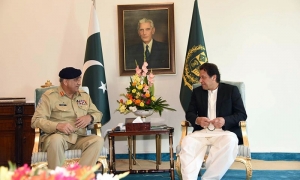
Editorial
In Pakistan, “sadly, human rights do not figure at the top of the state’s priorities.” Why?
Dawn in its editorial today (4 May 2020), responding to the recent publication of its annual report by the Human Rights Commission of Pakistan (HRCP) commented the above: Sadly, human rights do not figure at the top of the state’s priorities.
Why is human rights not a priority for the State in Pakistan?
Why blame only Pakistan in this context? For many countries, especially in the developing world, the human rights are not a priority for the State. At the global level, even the developed world, preach human rights within, but not practice the same in the developing world. Realpolitik guide the developed world; from Rwanda in Africa to Yemen in the Middle East and Myanmar in Southeast Asia, one could see the human rights taking a backseat from international practice.
Back to Pakistan. For the State in Pakistan, human rights are not a priority, because, in the first place, it is not monolithic. There is a State, run by certain Constitutional institutions, and then a “Deep State” that runs the former. While the government and institutions have to face accountability in one form or the other, the Deep State is accountable only to itself.
For the Deep State (and for the State institutions outside it) in Pakistan, the human rights are not a priority, because they are the primary violator of it. The Deep State has been linked (by the Pakistani media and others) with the number of disappearances, manipulation of political parties, media and even accountability institutions such as the NAB, militancy and even Pakistan’s foreign policy (CPEC, J&K, Afghanistan and the US).
Outside the Deep State, the patriarchal and feudal society in Pakistan ensures that the human rights violations go unpunished in the name of culture and honour. Many horrible crimes and violence against women, for example, go unpunished in the name of family honour and age-old traditions. Given the support (or the lack of it) from the society, the State is only willing to keep human rights away from its top priority.
Finally, as the Dawn notes in its editorial, the strength of the institutions. At the national and provincial levels, the institutions remain weak, primarily due to the political infighting, narrow politics, and also societal awareness. Even if the institutions under a few individuals try to become independent and strong, the Deep State in Pakistan would ensure otherwise.
In Focus
By Lakshmi V Menon & Abigail Miriam Fernandez
In Ali Wazir's funeral meeting, Manzoor Pashteen, another PTM leader, calls for a Jirga to unite the Pashtuns.
Pashtun Tahaffuz Movement (PTM) leader Arif Wazir was laid to rest in his ancestral graveyard after a drive-by shooting at his home in Wana, which left him with life-threatening injuries. Wazir died during treatment in Islamabad on 2 May. His funeral was attended by many along with Manzoor Pashteen, the PTM chief, and several other PTM leaders in Ghwa Khwa, near Wana.
As reported in the Dawn, Manzoor Pashteen condemned the murder and deemed it as an immense loss for oppressed groups stating that "there is a need to convene a Jirga to forge unity among Pakhtuns." Further, he asserted that eliminating terrorists and their hideaways are crucial at this time. He has called for a nationwide and global protest on 5 May, requesting workers to observe a "peaceful strike" to condemn the killing of Arif Wazir. This move also comes amid the persisting extremism that the Pashtuns have constantly fought against to secure their rights.
HRCP's annual report on human rights and Shireen Mazari's response to it
On 4 May, Pakistan's newspaper Dawn, while reporting the 2019 flagship report by the Human Rights Commission of Pakistan, criticized the Deep State for not prioritizing human rights. The HRCP report highlighted the violence, abuse and discrimination faced by women, children and members of religious minorities in Pakistan. The State's modus operandi of responding to isolated incidents that cause public unrest instead of forging systematic change by implementing rights-based legislation and strengthening institutions remain a concern. Dawn also said that the National Commission for Human Rights has been dysfunctional since May 2019. The flouting of child labor laws, honor crimes, the pending 1.8 million court cases, forced conversions, elusive nature of the justice system and dehumanization of prisoners are alarming.
On the other hand, Pakistan's Ministry of Human Rights said HRCP overlooked major milestones by the State in 2019, such as Zainab Alert, Response and Recovery Act, the National Action Plan against Child Abuse, crafting of a bill for the protection of journalists, laying the foundation for Pakistan's first Sikh university, the opening of the Kartarpur Corridor, renovation and reopening of Hindu temples and the acquittal of blasphemy accused like Aasia Bibi and Wajih-ul-Hassan, in safeguarding rights of vulnerable groups. Further, the ministry questioned HRCP's intent. Minister of Human Rights Dr Shireen Mazari said "changing mindsets, laws and institutions" are time-consuming processes but steps in the right direction have been laid by the PTI government.
Auguring constructive engagement, HRCP welcomed the ministry's response, clarified that the mentioned steps were listed in the report and stated that HRCP's judgement was despite these steps. Other recent reports on systematic curbs on press freedom and political dissent and attacks on journalists also paint a bleak picture of human rights in Pakistan.
In Brief
By A Padmashree & P Harini Sha
COVID-19
To control the damage, Pakistan wants to relax restrictions
The Planning and Development Minister has stated that the pandemic would cause one million institutions to close down and 18 million people to lose jobs, thereby extending the poverty line to 70 million people. Thus, one way to address this issue would be to relax the lockdown restrictions. Further, he said that this would be discussed at the National Coordination Committee Meeting on Covid-19 scheduled for 9 May. (Dawn)
Bilawal Bhutto accuses the federal government of fighting with Sindh, instead of COVID
The PPP chairman Bilawal has cautioned the Pakistan government on increasing the number of deaths due to coronavirus. He has accused the PTI-led government of fighting rather than tacking the larger issue. Further, He praised the efforts of the doctors and lower medical staff that have helped the Sindh government in taking steps to control the spread of the virus. (Dawn)
While Pakistan is fighting the COVID, NAB summons Shahbaz Sharif
The National Accountability Bureau (NAB) summons the president of opposition for the third time under cases of money laundering and for holding assets from an unknown source. NAB has called out that the evidence was inadequate in the documents submitted by Mr. Sharif. It has asked him to appear in person to respond to the unrequited questions. (Dawn)
82 Pakistanis stranded in India on Coronavirus lockdown
Around 82 Pakistanis are stranded in India due to the coronavirus lockdown in the states of Madhya Pradesh and Maharashtra. These Pakistanis came to India for pilgrimage and business purposes and their visa have expired. The police officials have stated that these Pakistanis will be allowed to go through the Wagah border after being sought by the Pakistan High Commission. (The International News)
INTERNAL
Besides the Coronavirus, the Locusts also divide the Centre and Sindh
The desert locust attacks on agriculture warn the food security of the country while the center and Sindh are engaged in conflicts over COVID 19 lockdown measures. Sindh government charged the center for 'doing nothing' to control the locust crisis. National Food Security minister replied to the crisis that the 18th amendments by the federal governments will facilitate better to deal with the locust issue with an international perspective along with the Locust monitoring Organizations. (Dawn)
Opinion: The government sees the present crisis as conducive to constitutional meddling
The opinion article on Dawn historically traces the evolution of the constitution and the struggles that are faced to survive as a democratic nation while commenting on the 18th amendments of the State. The article critically comments on the federal government's decision to reignite the controversial bill when the citizens are facing an existential crisis. Lastly, the article concludes by saying that the people are the political sovereigns and should reclaim the ground lost and build a 'real legal state'. (Dawn)
Dawn editorial says, PIA in shambles, no one to blame but themselves
The PIA has decided to derecognize associations especially airlines that operated to protect the interest of company employees. This is due to the priority of the government to use its airline service to bring back its overseas citizens. Thereby making it easy to derecognize. An editorial in the Dawn has stated that "If public-sector enterprises such as PIA are in a mess today it is because of years of incompetent management and banishment of such associations will only add to the woes of these enterprises. (Dawn)
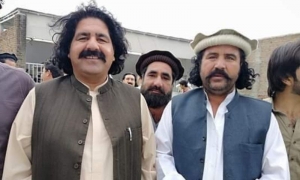
Editorial
Arif Wazir, a PTM leader succumbs to the injuries. His ghost will return to haunt Pakistan
Arif Wazir, one of the leaders of the Pashtun Tahaffuz Movement (PTM) who was attacked by unidentified people succumbed to injuries in Islamabad. He was attacked a few days earlier in front of his home in Wana in South Waziristan.
The PTM has been waging a tough battle for the rights of Pashtuns, especially the youths in the tribal belt of the KP. Unfortunately, instead of promoting them as a new and alternative voice from the tribal areas, the Deep State tried to oppress them. The media was under intense pressure from not to cover the PTM meetings and their discourse.
The militants were also against the PTM, as they were seen offering an alternative approach and also leadership. The latter – an alternative leadership, the Deep State is also apprehensive. The PTM was also very vocal in its opposition against the military operations in the tribal regions and had been demanding accountability.
So, who killed Arif Wazir?
Earlier, in 2007, Arif Wazir’s family members – including his father and uncle were killed by the militants near Wana. The Amnesty International has asked for an independent and effective investigation into Arif Wazir’s killing. It would not happen. The government would rather try to bury what had happened, as it would not want the PTM to have another martyr in the form of Arif Wazir. As Naqeebullah Mehsud’s killing in a fake encounter did in 2018.
In Focus
Daniel Pearl’s parents challenge the Sindh High Court’s verdict in the Supreme Court
Ruth and Judea Pearl, the parents of Daniel Pearl, the Wall Street Journal correspondent in Pakistan who was murdered, have filed a case in the Supreme Court, challenging the verdict of the Sindh High Court. Last month, in a landmark judgement, the Sindh High Court, overturned the acquittal of the prime accused – Omar Saeed Sheikh. Omar Sheik, a British citizen, born to Pakistani parents was earlier arrested in India for kidnapping British and American tourists in J&K in the 1990s; he was released by India as a part of the ransom against an Indian flight hijacked to Kandahar from Kathmandu.
The Sindh High Court, unfortunately, turned down the verdict against Sheikh, citing insufficient evidence.
Senior counsel Siddiqui, who has filed the case on behalf of the Pearls, said in a statement: It is a defining case for the Pakistani State and its judicial system, involving freedom of the press, the sanctity of every life, freedom from terror and the manifestation of a welcoming and safe Pakistan to the world. Rarely has any court case embodied and risked such fundamental values.”
In Brief
Centre and Sindh continue to differ over COVID-19
The public differences between the provincial and federal ministers continue on how Pakistan should fight the COVID-19. Sindh’s ministers (Syed Nasir Hussain Shah and Saeed Ghani ) publicly oppose Islamabad’s policy on using the biometric. They said: “The world is discouraging the use of biometric for the time being and many countries have put a ban on the technology being used there for different services. But our leaders at the Centre are unable to understand the basic points.”
Dawn quoted Mr Ghani blaming the PTI: “It’s a proven fact that the federal government and its ministers are deliberately sabotaging the spirit of service of the Sindh government. This cannot be tolerated for long.”
On the other hand, Senator Shibli Faraz, the newly appointed Federal Minister for Information and Broadcasting warned Bilawal Bhutto for undermining the atmosphere of national unity and said that the Sindh government is blaming “their own failures on the federation”.
COVID
Pakistan faces a record number of deaths on Saturday
On Saturday, Pakistan recorded 32 deaths, and 1200 plus confirmed cases on a single day. Nearly half of the deaths on Saturday came from KP, and over a quarter from Punjab. While half of the newly recorded cases on Saturday came from Sindh.
The total number of cases as on 3 May in Pakistan has crossed 19,000. (Dawn)
90 per cent of the stranded Pakistanis are in the Gulf
According to a data, 90 per cent of the Pakistanis who are stranded abroad are in the Gulf countries – mainly UAE, Saudi Arabia and Qatar. Close to 100,000 Pakistanis are stranded abroad, out of which there are close to 70,000 in UAE and 15,000 in Saudi Arabia.
INTERNAL
“Never before has Pakistan’s media been in such deep peril,” says Dawn
In its editorial, on the eve of World Press Freedom Day, in a hard-hitting note, Dawn, one of the leading dailies of Pakistan, observed: “The threat has evolved from actual physical harm, particularly common during the war against terrorism in the country, towards a more insidious form of persecution where plausible deniability enables the perpetrators to oppress the media without any consequences for themselves.” (Dawn)
Pakistan’s Ministry of Human Rights responds to the HRCP and says the annual report for 2019 has overlooked many milestones
The Human Rights Commission of Pakistan (HRCP) released its annual report looking at the State of human rights in the country during 2019. The ministry in its response to the report said, though the HRCP is right in terms of citing the high number of violence against women and children, the report “does not account for the important institutional and legislative measures taken in the last year to safeguard and promote their rights.” In a hard-hitting report, that was released on 30 April, the HRCP noted, “that widespread social and economic marginalisation have left the weakest segments of society invisible and unheard.” (Dawn)
ECONOMY
Pakistan’s exports to Europe declines
According to a State Bank of Pakistan data, Pakistan’s exports to Northern Europe comprising of Denmark, Finland, Norway, Sweden and UK have fallen by 3.21 per cent in March this year, when compared to the same period last year. The UK was Pakistan’s top export destination until March this year. While its exports to southern Europe remained the same, there is an increase in Pakistan’s exports to western Europe comprising of Belgium, Netherlands and Europe have increased. Outside the UK, Germany, Spain and Italy are the next top destinations for Pakistan in Europe. (Dawn)
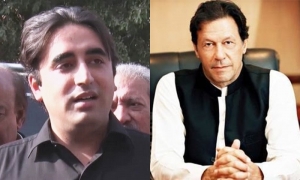
editorial
In a federation, Centre-Province coordination is essential to deal with an emergency. Pakistan lacks it
One of the reasons for Germany's success in addressing COVID-19 in Europe is its federal structure, and how the Centre made the best use of it. Second, the leadership of Angela Merkel, where she looked at the crisis beyond any partisan politics and has been unwavering in how she saw the crisis. Imran Khan lacks both.
As the Prime Minister, Imran Khan did not understand the seriousness of the crisis in the early stages and was wavering between lockdown and keeping the economy afloat. Whether to receive the Pakistani students stranded in China or take a decision on lockdown, other factors weighed more on his decision making.
Second, unlike Merkel, he lacks political maturity in dealing with the provinces. He finds Sindh as a challenge to fight COVID-19, than as a model, that he can employ in the other provinces, especially Punjab. Whatever may have been the drawbacks of the PPP government in Sindh, its Chief Minister Syed Murad Ali Shah took his best foot forward in fighting the virus. He made Sindh an early bird; from testing to decisions, the provincial government was unwavering in terms of how it saw the virus and how it should be fought.
Unfortunately, the PTI government in Islamabad sees Karachi's success as a threat to its future in Sindh. Moreover, it wants the debate on Sindh's success to move away; the sudden focus on the 18th amendment by the PTI and the Corona Tiger Force – are strategies of a partisan approach. Perhaps, Imran Khan wants the PPP to fail in Sindh, than Pakistan winning the COVID-19.
in focus
By Lakshmi V Menon & Abigail Miriam Fernandez
Pakistani journalist living in exile found dead in Sweden
Sajid Hussein, a Pakistani journalist, belonging to Balochistan, living in exile in Sweden, was found dead on 23 April. He was the chief editor of an online magazine called the 'Balochistan Times' and was also doing part-time in Uppsala University when he was reported missing on 2 March.
On 1 May, Stockholm Police spokesperson said that while the autopsy had ousted some suspicion of his death being the result of a crime, it could not be completely ruled out. Reporters without Borders' (RSF) Swedish branch head said that the possibility of a crime connects the death to his work as a journalist.
These developments surface in the wake of the release of Freedom Network's recent 'Annual Press Freedom Report' for Pakistan which painted a bleak picture and named Islamabad the most dangerous and riskiest region for journalists. It pointed out that the State's chokehold on press freedom, systematic curbing of political dissent, harassment and forcing of self-censorship were dwindling access to information and freedom of expression in Pakistan.
The disappearances of Baloch, coupled with the lack of Baloch media houses, remain a pressing problem that has caused Balochis to slowly become a minority in their own province and shaken the federation of Pakistan.
PM Imran Khan should resign, says Bilawal; For the Centre, Sindh is blame gaming
On 1 May, PPP Chairman Bilawal Bhutto Zardari demanded that PM Imran Khan should resign and be replaced if he is unwilling to work amid the rising issue of the coronavirus that the country is facing. He stated that the federal government has not extended support to the provincial government in their efforts to fight against the coronavirus. Further he said that the despite the Sindh government doing the most to tacking the coronavirus issue it has only come under criticism and did not receive the required support from the federal government.
Bhutto added that the federal government failed to provide the basic demands of doctors, nurses, and other paramedical staff and the necessary equipment for their protection in their fight against the coronavirus. Further, he added that the federal government has disappointed the provinces as they alone could not have handled the current situation.
On the other hand, PTI's Minister for Information Senator Shibli Faraz stated in a press conference that Sindh was pushing its inability to handle the coronavirus situation upon the Centre.
Casualties of militant attacks have increased in April: Think Tank Report
Pakistan Institute for Conflict and Security Studies (PICSS), an Islamabad-based think tank, said that although the number of militant attacks in April remained the same as that in March, the number of casualties of such attacks showed a six per cent increase in April; however, injuries decreased by 75 per cent. An increase was also recorded in the activities of Pakistani security forces against militants (16 actions).
Nine militant attacks were recorded during April; six security personnel were injured and 18 people killed — eight militants and 10 security personnel. Tribal districts of KP recorded the greatest number of violent militant attacks, killing eight security personnel and eight militants. 21 more militants were hunted down by the security forces. Other provinces that witnessed militant attacks were Balochistan (two) and Sindh (one); minor attacks with two casualties in Balochistan. A Chinese national was also abducted in Sindh.
IN BRIEF
By A Padmashree & P Harini Sha
COVID-19
Sindh exceeds Punjab on virus-infected patients
The Special Assistant to the Prime Minister has reported that during the last 24 hours, the highest number of cases are in Sindh with 398 cases followed by 289 cases in Punjab. According to a Dawn report, "the increase in the daily tally of infections comes at a time when the federal government is going to further ease the lockdown and moving towards opening of more industries and businesses." (Dawn)
In KP, the death toll hikes in Khyber Pakhtunkhwa (KP)
According to a Dawn report, the mortality rate for the province is 5.75 per cent; this is more than double the national rate, which is 2.2 per cent. As on 1 May, there have been 161 fatalities in the province, and the total number of patients tested positive is 2799. Peshawar alone has reported 96 deaths. According to a WHO note, KP has the lowest testing ratio amongst the four provinces. (Dawn)
Islamabad and Rawalpindi sees the highest number of COVID19 patients in one day
The twin cities witnessed the highest number of COVID 19 cases in 24 hours since the outbreak. On 30 May, Rawalpindi reported 50 new patients and Islamabad Capital Territory reported 30 new patients and the total COVID 19 positive cases in the region is 874. (The News)
Around 12 million go jobless in Pakistan due to the pandemic
The Punjab Governor notified that more than 12 million people have lost their jobs in Pakistan alone. (The News)
INTERNAL
The Federal government faces an obstacle in forming a unified policy
The lack of unity within the divisions of Pakistan has become a problem in framing and executing a protective policy to counter the virus spread. The information minister has stated, "The government wants that the sessions of both the National Assembly and the Senate are held, but it is vital to adopt precautionary measures". The government foresees to protect its economy while following smart lockdown. (Dawn)
The Opposition demands a physical session of the National Assembly
The PML-N has asked to conduct a physical session, and the government has an obligation to respond on or before 6 May. The government, according to a news report, a trying to dissuade the PML-N from not pressing ahead. The PML-N made a similar demand earlier but withdrew the same, but now, the party says it is dangerous. The government wants to avoid the same and have a virtual session. (Dawn)
PTM leader attacked by unknown assailants in Waziristan
Arif Wazir, a leader of the Pakistan Tahaffur Movement (PTM), suffered severe injuries during an attack by assailants outside his residence in the South Waziristan tribal district on Friday. His family was killed in a clash with militants in the year 2007, and he was released from the prison on bail after one month ago. (Dawn)
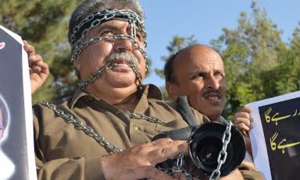
IN FOCUS
Pakistan’s 2019 human rights record “greatly worrisome” says Human Rights Commission of Pakistan
By Lakshmi V Menon
The Human Rights Commission of Pakistan (HRCP) released its annual flagship report ‘State of Human Rights in 2019’ on 30 April. The report marks 2019 as the year of systematic curbs on political dissent, widespread economic and social marginalization, chokehold on press freedom, soaring poverty indicators and unemployment; shunning the weakest societal segments into the dark. The report analyses vulnerable groups, curbs on free speech, law and order and constitutional compliance.
According to the report, child labour, sexual abuse, trafficking and murders were faced by children. At least 2,846 cases of child abuse were reported. Women faced honour crimes (the highest from Punjab) and discriminations financial inclusion, employment, education and political representation. Prisons were overpopulated and unhygienic to sub-human levels, increasing the vulnerability of prisoners to AIDS/HIV, tuberculosis and hepatitis, besides mental illnesses. Religious minorities faced forced conversions, desecration of places of worship and social discrimination.
Conflict-related deaths declined and casualties of counterterrorism operations and terror attacks reduced from 2,333 in 2018 to 1,444 in 2019. Police extortions, custodial tortures, and refusal to file FIRs were reported. Regarding the dispensing of justice, 1.8 million cases were pending by the end of 2019 compared to 1.9 million in 2018. The report says PTI’s “rhetoric of curbing corruption and ending financial debt was turned upside down” and calls for Pakistan’s commitment to equal citizenship rights, “the federal and democratic character of the constitution with civilian supremacy ensured through Parliament.” Mr Rehman, HRCP honorary spokesperson, termed Pakistan’s 2019 human rights record ‘greatly worrisome’ and said Covid-19 would deteriorate the country’s human rights prospects.
Islamabad, the most dangerous for journalists, says Pakistan Press Freedom Report
By Lakshmi V Menon
On 30 April, the Pakistan Press Freedom Report 2019-20, titled “Murders, harassment and assault: The tough wages of journalism in Pakistan”, was released to commemorate the upcoming World Press Freedom Day on 3 May. As per the report, violence is common against Pakistani journalists and more common in Islamabad, the federal capital, with 34 per cent of all violent attacks in Pakistan, making Islamabad the most dangerous region for journalists.
The report by the media rights watchdog, Freedom Network, cited 91 violent cases between May 2019 and April 2020, of which 31 occurred in Islamabad, 24 in Sindh, 21 in Punjab, 13 in KP and three in Balochistan. These included seven journalist murders, abductions, confinements, arrests, attacks, threats, harassment, lodging of legal cases, physical assaults and other offences.
The largest pool of victims (63 cases) were TV personnel, followed by those from print media (25 cases). In 42 per cent of the cases, victims suspected involvement of state agencies. Other perceived perpetrators include influential individuals, religious groups and political parties, besides criminal gangs.
Iqbal Khattak, head of Freedom Network, said attacks forced journalists to practice self-censorship. He added that “the state and its functionaries” are the “principal threat actor” for media amid growing silence and submission. The report comes at a time when the ruling PTI is facing national, regional and global criticism for the unlawful arrest of Mir Shakil-ur-Rahman, the Chief-editor of Jang/Geo group, a media house that published information against Imran Khan’s government. (Dawn, 1 May, 2020)
SC allows formation of caretaker govt for GB polls
By Abigail Miriam Fernandez
On 30 May, the Supreme Court permitted the federal government to conduct the upcoming general elections in Gilgit-Baltistan (GB) under the Election Act 2017 and further amended the law which would install a caretaker government for conducting the elections. Further, the Attorney General for Pakistan stated that the amendments would be made through the implementation of a presidential order.
The federal government’s application seeking amendments to the Government of Gilgit-Baltistan Order 2018 to conduct general elections by adopting the Election Act 2017 was heard by a seven-member bench. The apex court has given a short order while a detailed verdict would be announced later. Further, the advocate general of GB said that the GB government had no objection to the federal government’s appeal.
With the tenure of the GB government expiring on the 24 June, the next general elections in the region would become due within 60 days after the expiry of the GB Legislative Assembly, thus it became crucial to provide a legal mechanism that would assist in conducting the elections and formation of the caretaker government. Further, the verdict gave an explanation for Article 187 of the Constitution which gives special jurisdiction to the Supreme Court over GB, raised concern about the status and rights of the GB people in Al-Jehad Trust case and also reiterated the human rights jurisprudence of the apex court which would continue to serve towards securing the liberties and rights of all the people and GB.
IN BRIEF
By A Padmashree & P Harini Sha
Covid-19
Pakistanis returned to Punjab tested positive for the coronavirus.
Of the 3,554 Pakistanis who returned through the special flights from various countries in the past two weeks, 259 passengers have tested positive for coronavirus. The 767 passengers from UAE, Qatar, New York, and Colombo are quarantined and kept for an incubation period for the testing process. (Dawn)
The Corona Relief Tiger Force is officially set to begin
The one million volunteers of the Corona Relief Tiger force (CRTF) are expected to come into force after the formal address by Imran Khan. The CRTF volunteers will officially begin their operation in the three provinces: Punjab, Khyber, and Balochistan. The responsibilities of CRTF include assisting the government in the imposition of lockdown, preparing funerals, and maintain social distancing during the month of Ramadan. The opposition parties have opposed the plan as it would politicise the national effort to fight the coronavirus. (Dawn)
Pakistani workers lost jobs in UAE, expected to return
More than 13,000 Pakistani workers have lost their jobs in the UAE due to the outbreak of the coronavirus. The Pakistan Foreign Office has said that the Gulf countries and UAE host about 4.5 million Pakistan workers and due to the outbreak of COVID-19, the oil prices dropped to record low which hit hard the Pakistani workers. More than 50,000 Pakistani citizens from the Middle East are expected to return to Pakistan in near future. (The Express Tribune)
External
Dawn's editorial says the Afghan deal is doomed
In its editorial, Dawn wrote: The options for Afghanistan are grim. If the foreign forces stay, the status quo will continue, as the Taliban continue to hammer the weak dispensation in Kabul. Moreover, nearly two decades of foreign intervention have failed to give the Afghans a functioning state that can deliver the basics. If the foreign forces leave and there is no agreement between Afghan factions, the country is likely to implode and return to the chaos of the post-Soviet Mujahideen era. Neither of these is an attractive option for the Afghan people. (Dawn)
On India
Pakistan pays tribute to Rishi Kapoor and Irffan khan.
Rishi Kapoor, the News in its editorial noted: "In the later years of his life, he also spoke out openly on Indo-Pakistan relations and the need to build bridges between the two countries. To many in Pakistan, remembering Rishi Kapoor comes with a hit of nostalgia. Chintu, in his many different sweaters, holding a dafli or tweeting about South Asian solidarity – he will be missed." On Irffan it said, "He combined the careful planning of Hollywood with the more slapdash style of Bollywood and created a new vision of film." The editorial paid tribute to both: "Rishi Kapoor and Irrfan Khan brought to acting a vision that was entirely their own, informed by both their generations and backgrounds. They truly will live on in the songs, music, and ideas and emotions they evoke through performances (The News International)
Pakistan Army complains of unprovoked ceasefire violation and deliberate targeting of civilians by India
According to a release by the Inter-Services Press Release (ISPR), "Indian Army initiated unprovoked ceasefire violation (CFV) in Kailer & Rakhchikri Sectors along LOC. In Kailer Sector, Indian troops targeted Pakistan Army posts with automatics and heavy weapons. Pakistan Army responded effectively. Reports of heavy losses to Indian troops in men and material. During exchange of intense fire, Lance Naik Ali Baz, age 34 years, resident of District Karak, embraced shahadat. In Rakchikri Sector, Indian Army troops deliberately targeted civilian population. Due to indiscriminate fire in Kirni village, a girl age 16 & a woman age 52 years were martyred while a 10 years old boy & 55 years old woman got injured." (ISPR)
Pakistan's Foreign Office spokesperson claims of exposing BJP's campaign to demonise Muslims
In a weekly media briefing, the Foreign Office spokesperson claimed: "The foreign minister apprised the OIC Secretary General about the BJP government’s systematic campaign to demonize Muslims by holding them responsible for the spread of Coronavirus." Referring to the United States Commission on International Religious Freedom (USCIRF) she also said: "The report acknowledges that the present Indian government used its strengthened parliamentary majority to institute national-level policies violating religious freedom across India, especially for Muslims, most notably, enactment of the Citizenship (Amendment) Act." (The News)